10 Homework Tips for High School Students
- by Daniel Friedman
- 6 minute read

Having trouble getting focused with homework? Here are 10 simple homework tips for high school students to make life much easier!
Hopefully after reading this, you’ll find a more enjoyable way to do homework while also being focused and efficient.
Let’s get started…

Prioritize Your Classes
Write down your homework everyday at school as it’s being assigned in some sort of agenda, planner, or notebook.
At the end of every day, list your homework assignments in order of how you’re going to do them. I recommend starting with the harder assignments first and finishing off with the easier ones.
Be sure to keep in mind what homework will need more time than others. If you have a project, essay, or long studying to do, start with that first.
This is going to give you the basics of how to organize your homework after school and what to prioritize.
Blue Pen, White Paper
Writing with a blue pen on white paper is the easiest way to remember your writing. It is scientifically proven to help retain information more efficiently than any other writing combo.
This is literally hacking your brain to memorize things easier. It is one of the best homework tips for high school students to use.
Try using this trick during your actual classes in school. That way when you study, you’ll already have your notes written in the best format.
Using other memory tools such as bullets, numbers, drawings, and highlights are also efficient ways to make studying a breeze.
Related Post: 7 High School Hacks Every Student Should Know
Take breaks often.
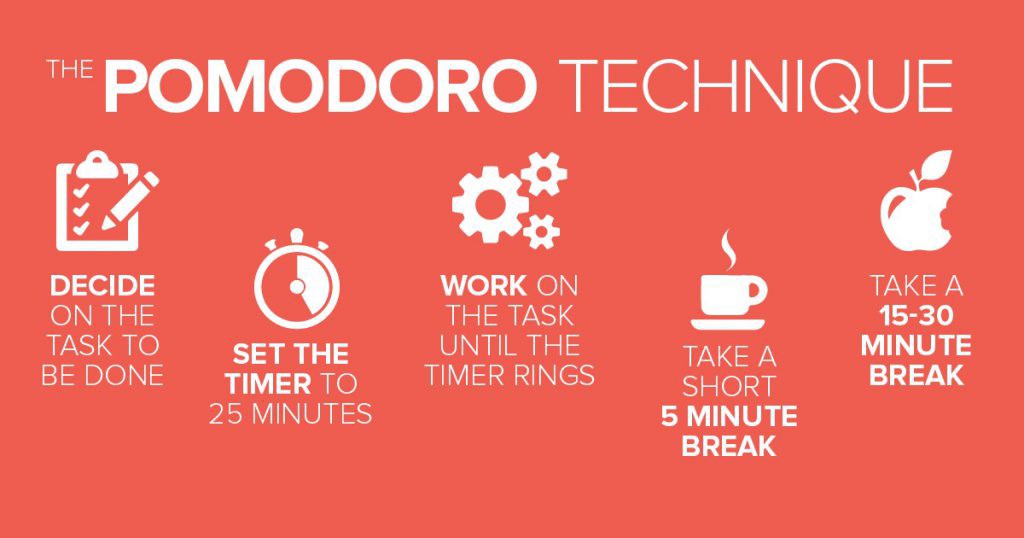
There is a technique in efficiency known as the Pomodoro Technique. Here is the basic formula for how it works:
- Work for 25 minutes
- Take a 5 minute break
- Repeat 4 times
- After the 4th cycle, take a longer 30 minute break
This is the best studying technique in the world for not only retaining information, but also no burning out while working on any task.
It will come in handy when you have long hours of homework that may seem impossible for your attention span.
There are actually Pomodoro timers out there online that you can use to remind you when it’s time to take a break.
Get Rid of Distractions
This one is obvious, but crucial!
Clear your desk, turn off your phone, avoid social media on your computer, and even clean your room.
A decluttered environment is a decluttered head. You will be able to focus much harder on the task at hand when there aren’t a bunch of distractions in your face.
You should also allow as much light to enter your room as possible. Open blinds, turn on lamps, and turn up your computer’s brightness (if you do homework on it).
More light in a workspace is proven to improve focus and efficiency.
Start Right When You Get Home
Getting in the habit of starting your homework right when you get home as a high school student is going to save you a lot of procrastination.
When you get home, eat something and then prepare yourself homework. Getting it done early will also give you unlimited free time until you go to sleep.
Taking your break first and then doing homework can cause anxiety from the fact that you don’t know how much time you have left to complete your assignments.
Do yourself a favor and avoid that anxiety. It feels much more rewarding to finish your homework and have the rest of your day to do whatever you want.
Related Post: 10 Time Management Tips for Teens
Finish homework during school.
This might be one of the best homework tips for high school students who don’t do much during lunch breaks.
This will save you so much time when you get home. I have literally finished over half of my homework before I even stepped foot in my house most days.
Utilize your breaks in between classes to work on smaller assignments that can be done without much focus.
Doing this homework in a group of friends that share the same classes will also help you get the homework done faster. Win-win!
Do Homework with Friends
When you get home, hop on a FaceTime, Skype, or Zoom call and do homework with friends.
This will benefit you in 2 main ways. One, you can share answers, insight, and make the work go by faster. Second, it’s simply way more fun!
You can essentially split the workload depending on the type of homework. You’ll also learn from each other, create closer bonds, and quiz each other for upcoming tests.
There are clearly many benefits to working in a group that most high school students miss out on. Even 1 friend can save you a ton of time and effort.
Related Post: How to Manage Online Classes
Utilize outside sources.
Homework doesn’t only have to be done with your class textbooks and notes from school.
Utilize certain outside sources such as Youtube, Khan Academy, and Slader.
Slader is one the greatest homework apps of all time, especially for math. It provides step by step solutions to all of your textbook’s questions.
They have so many subjects on their app! Here are a few:
- Foreign Language
If your homework is done directly from textbook questions, chances are that Slader has the answers for you already. Look up your book name or ISBN number and find solutions to everything you need.
Same thing goes with Youtube, Khan Academy, and other online sources. This generation has more access to information than any other generation ever. Take advantage of it!
Work on a Full Stomach
Starting homework on a full stomach eliminates the need to get up from necessity.
Our brain naturally starts to focus on our hunger, thirst, or going to the bathroom if it exceeds the need of the task you’re currently doing.
When you’re doing homework, take breaks, but take them voluntarily. You won’t be able to focus one bit if your mind is on other things.
Get home, eat a nice meal, drink water, go to the bathroom, and start doing your homework. A full stomach from a good meal will also help your brain work better.
You’ve probably been told to eat a good breakfast before a test day to be “smarter”. The same thing applies to doing your homework.
Pro tip: Dark chocolate is proven to regain your focus on the task at hand. If you start getting distracted easily for no reason… have a treat.
Related Post: 10 Habits of a Successful Teenager
Listen to music without lyrics.
I highly recommend listening to music while you work. However, listening to music with lyrics is a bad idea.
Find a no lyric playlist on any Music platform such as Spotify, Soundcloud, or even Youtube. Youtube has a constant live stream called “lofi hip hop radio” that has no lyrics and is excellent at helping you work.
Listening to music will not only help you focus, but it also makes homework more enjoyable. Without it, your mind will wander to different places.
Plus, music in your ears means less noise from the outside world. Everyone hates being distracted while doing homework by someone yelling outside your room.
Pop those headphones on and tunnel vision into your assignment!
Hopefully these were the best 10 homework tips for high school students you’ve ever heard. Try implementing them into your next homework session at home and in school.
They helped me so much during the last couple of years of high school. I wish for them to do the same for you!
Good luck this semester!
If you have any comments, questions, or suggestions leave them down below. Thanks for reading!
Daniel Friedman
Hey, I'm Daniel - The owner of Modern Teen! I love sharing everything I've experienced and learned through my teen and college years. I designed this blog to build a community of young adults from all around the world so we can grow together and share our knowledge! Enjoy and Welcome!
Leave a Reply
Your email address will not be published. Required fields are marked *
18 Things To Do When You Turn 18 (By a 20 Year Old)
10 things to do while you're still young (for a better future), you may also like.

10 Best Mini Fridges for Dorms in 2024
- February 7, 2022
- No comments

Puberty for Boys (What Happens + Common Questions)
- February 15, 2021
25 Study Skills for High School Students: Mastering Each Skill

High school is a crucial period in a student’s academic journey, filled with opportunities and challenges. It’s a time when students start to gain more independence and responsibility for their own learning. To thrive in high school and beyond, one essential skill to develop is effective study skills. In this blog post, we will explore why study skills for high school students are so important and provide a comprehensive guide to mastering them.
Why Study Skills Matter in High School
Table of Contents
Academic Challenges in High School
High school presents a unique set of academic challenges. The coursework becomes more complex, the pace quickens, and students must juggle multiple subjects and extracurricular activities.
Additionally, high-stakes exams like the SAT or ACT and college admissions become prominent concerns. To navigate these challenges, students need strong study skills.
The Role of Study Skills in Success
Study skills are the foundation of academic success. They enable students to become more efficient, focused, and organized in their learning. Effective study skills for high school students not only help to absorb information but also retain it and apply it effectively. They are the tools that turn hard work into smart work.
Benefits of Developing Good Study Skills
Developing good study skills has numerous benefits. It can lead to higher grades, reduced stress, improved time management, and increased self-confidence.
These skills are not just relevant in high school; they are transferable and will serve students well in college and their future careers. As such, investing time and effort into developing effective study skills is an investment in a successful future.
| Unlock your academic potential! Get expert across subjects for (T&C apply). Take the first step to success today! |
25 Study Skills for High School Students
- Effective Time Management: Create a schedule to balance classes, homework, and extracurricular activities.
- Organizational Skills: Use planners or apps to keep track of assignments, deadlines, and important dates.
- Active Listening: Pay attention during lectures to grasp key concepts and take meaningful notes.
- Note-Taking Techniques: Develop shorthand and organizational methods to jot down lecture highlights.
- Critical Reading: Analyze texts, identifying main ideas, supporting details, and underlying themes.
- Mind Mapping: Use visual tools to organize ideas and create connections between different concepts.
- Prioritization: Focus on tasks that are due sooner while managing long-term projects effectively.
- Goal Setting: Set specific, measurable, achievable, relevant, and time-bound (SMART) goals for academic tasks.
- Stress Management: Practice relaxation techniques like deep breathing or meditation to alleviate stress.
- Healthy Study Environment: Create a quiet, well-lit, and organized space conducive to focused studying.
- Digital Literacy: Utilize online resources and educational platforms for research and learning.
- Collaborative Learning: Form study groups to discuss topics, solve problems, and reinforce understanding.
- Effective Communication: Engage with teachers and classmates, asking questions when concepts are unclear.
- Self-Discipline: Avoid procrastination by breaking tasks into manageable chunks and adhering to deadlines.
- Test-Taking Strategies: Learn techniques like process of elimination and time management during exams.
- Self-Assessment: Regularly evaluate strengths and weaknesses to adapt study methods accordingly.
- Healthy Lifestyle: Maintain a balanced diet, exercise regularly, and get adequate sleep for optimal brain function.
- Utilize Resources: Make use of library resources, academic databases, and online tutorials for research.
- Creative Study Techniques: Use mnemonic devices, flashcards, and storytelling to enhance memory retention.
- Effective Internet Research: Evaluate online sources for credibility, relevance, and accuracy in research assignments.
- Feedback Incorporation: Learn from feedback on assignments and exams to improve future performance.
- Time Blocking: Allocate specific time blocks for different subjects, activities, and breaks in the study routine.
- Positive Mindset: Cultivate a positive attitude, embracing challenges as opportunities to learn and grow.
- Adaptability: Be open to changing study strategies if current methods aren’t yielding desired results.
- Continuous Learning: Stay curious, explore diverse subjects, and cultivate a lifelong love for learning.
How to Refine Your Study Skills?
Refining your study skills is a continuous process that involves self-assessment, adaptation, and the implementation of effective strategies. Here are steps to help you refine your study skills:
Self-Assessment:
- Reflect on your current study habits and their effectiveness.
- Identify areas where you struggle or need improvement, such as time management, note-taking, or test preparation.
Set Clear Goals:
- Define your academic goals and objectives for each study session.
- Knowing what you want to achieve will help you stay focused and motivated.
Time Management:
- Create a study schedule that fits your daily routine.
- Allocate dedicated time for each subject and task, allowing for breaks and leisure activities.
Organization:
- Use planners, calendars, or digital tools to keep track of assignments and deadlines.
- Organize your study materials and workspace for maximum efficiency.
Note-Taking Techniques:
- Develop a note-taking system that works for you, whether it’s Cornell notes, mind maps, or outlines.
- Focus on capturing essential concepts and main ideas during lectures.
Active Reading:
- Approach reading assignments critically, looking for main ideas, supporting details, and connections.
- Annotate texts and highlight key points to aid comprehension and future review.
Effective Study Strategies:
- Experiment with various study techniques, such as flashcards, practice tests, and group discussions.
- Identify which methods yield the best results and incorporate them into your routine.
Test Preparation:
- Learn test-taking strategies, including time management, question analysis, and the process of elimination.
- Regularly review and quiz yourself to assess your knowledge.
Stay Informed:
- Keep up with your coursework, attending classes, and actively participating.
- Seek clarification from teachers or peers when you encounter difficulties.
Healthy Lifestyle:
- Maintain a balanced diet, engage in regular physical activity, and get sufficient sleep.
- Physical well-being is closely linked to cognitive performance.
Resources: Study Skills for High School Students
Recommended books and websites.
- “How to Study in High School”
- Study guides and resources on websites like JavaAssignmentHelp, CodeAvail, and CallTutors
Study Apps and Tools
- Notability for note-taking
- Anki for flashcards
- Forest to block distractions
School-Based Resources
- School libraries and librarians
- Academic support services and tutoring programs
Real-Life Success Stories
To inspire high school students, share stories of individuals who improved their study skills and achieved remarkable academic success. Highlight the journey, challenges faced, and the strategies that led to their triumphs.
In conclusion, mastering study skills for high school students is not just a valuable asset; it’s a critical tool for high school students striving for academic excellence and personal growth.
Effective study skills can help students navigate the challenges of high school, set a strong foundation for college and career success, and equip them with skills that will serve them for a lifetime.
By implementing the study skills and strategies outlined in this guide, high school students can unlock their full potential and take control of their academic journey.
Related Posts

Step by Step Guide on The Best Way to Finance Car

The Best Way on How to Get Fund For Business to Grow it Efficiently
- Grades 6-12
- School Leaders
Check Out Our 32 Fave Amazon Picks! 📦
Ultimate Study Skills Guide: Tips, Tricks, and Strategies for Every Grade
Because they really do need to learn how to learn.
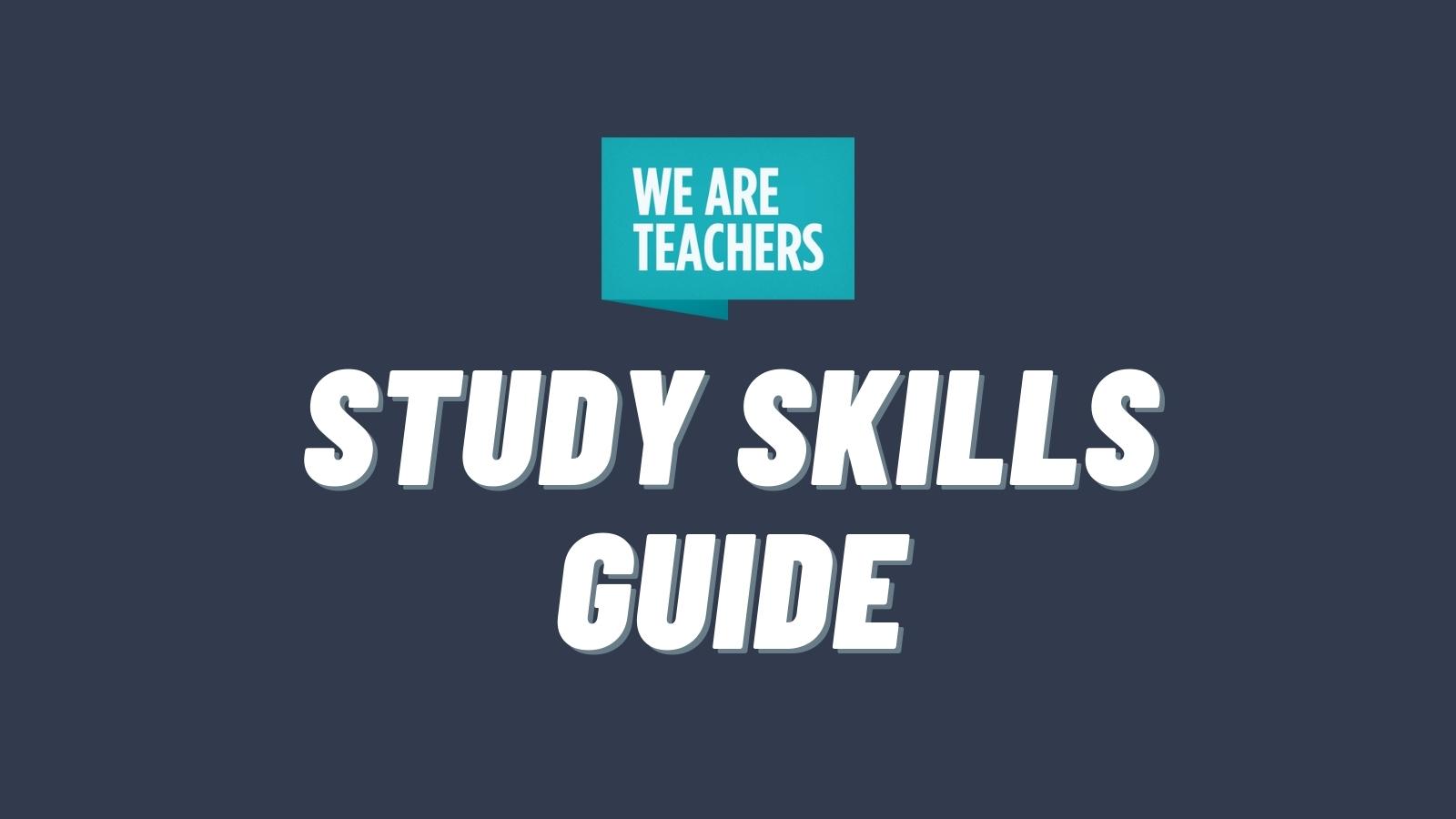
It’s not an exaggeration to say that study skills are life skills. Taking good notes, creating a focused workspace, managing distractions, making plans—any and all of these are skills people of all ages use every single day. Taking time to teach good study skills up front can equip students to succeed in school and beyond.
We’ve broken down many of the top study skills students need, including examples by grade level. Remember that there are a lot of different ways to study successfully. Offer students options and help them find the strategies that work best for them.
Study Spaces
Organization and time management study skills, learning styles, taking and using notes, effective reading study skills, completing assignments, test taking, finding help.

Choosing the right place to study is the first step to good study skills. Teach students to consider these elements.
Choose Your Space
For some students, this means a dedicated study space like a desk in their room. Others may prefer to curl up in a chair with a lap desk or work at a table in a common space. Whichever they choose, it should be an area that’s dedicated to study while they’re using it.
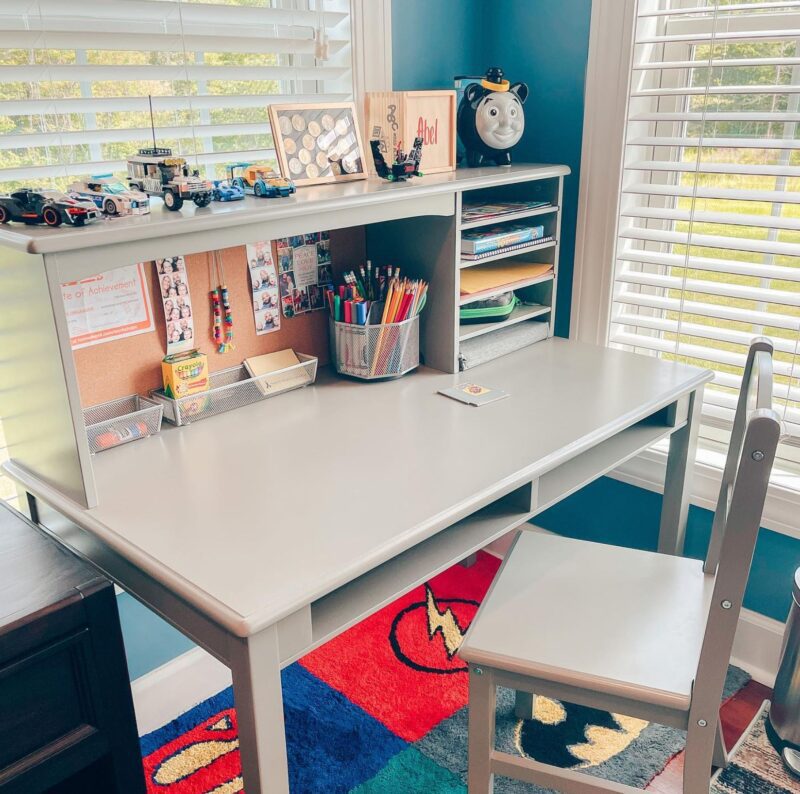
Source: organizeandarrangeit/Instagram
- Elementary School: Many students begin doing homework on the dining room or kitchen table, where parents can supervise. As students get older, encourage them to explore other spaces too, especially those where they can work independently.
- Middle School: By this age, kids will probably need a dedicated study space of their own, where they can keep supplies and works-in-progress. If that’s not possible, create a bin or box where they can store stuff while they’re not using it, then pull it out when it’s time to study.
- High School: Older students should be able to carve out a study space pretty much anywhere, since that’s something they’ll need to be able to do in the working world too. As long as they’re able to concentrate and get their work done, don’t be too picky about where they choose to do it.
Make Yourself Comfortable
“Comfortable” looks different for every person, so don’t assume all kids need to be sitting at a desk to work well. At the same time, they shouldn’t be so comfortable that they’ll fall asleep!
- Elementary School: When kids are doing independent reading, let them choose any spot they like. For other work, make sure they have a sturdy writing surface, like a table or lap desk. Ensure they have enough light to see what they’re doing, and teach them good posture if they’re sitting in a chair so they don’t develop stiff muscles.
- Middle and High School: Show them how to adjust the font size on screens so they’re not squinting to read. Encourage them to use blue light filters if they’re spending a lot of time on computers.
Manage Distractions
Learning to concentrate while ignoring distractions is a key life skill, and one that we all need to develop. Some students will have no trouble tuning things out, while others are going to need a lot of help with this one.
- Elementary School: Kids at this age are very easily distracted, so their study space should be as calm as possible. If a quiet room isn’t available, they might need noise-canceling headphones or even a white-noise machine to help them concentrate. Muting the TV isn’t enough—be sure it’s off completely. Remind friends and siblings to leave kids alone while they’re working.
- Middle School: These kids are old enough to recognize distractions but might still have trouble handling them. Encourage them to turn off phones and electronics (although some students are fine listening to music while they work). Students at this age are old enough to politely ask friends or family not to interrupt them while they work.
- High School: By this time, students know that the world is full of distractions and you can’t quiet them all. But you can teach them to mute their phone and messaging notifications, close all unnecessary windows on their laptops, and be firm about letting others know they need to be left alone to study.
Gather Your Supplies
One way to eliminate distractions is to ensure you have everything you need in place before you start. This includes books, notes, office supplies, and more. All kids should have water and some healthy snacks on hand too.
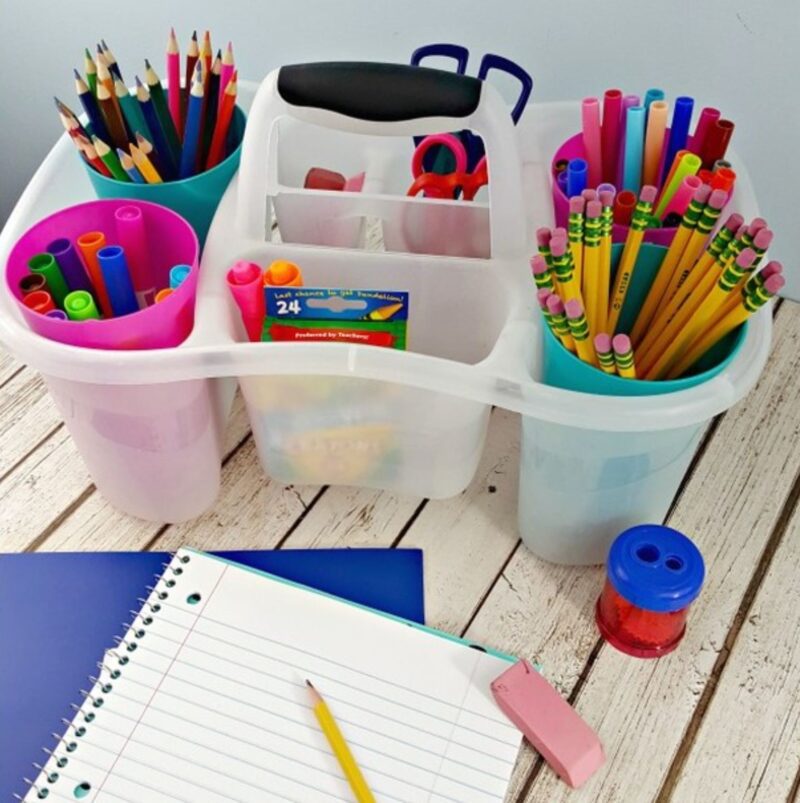
Source: jugglingactmama/Instagram
- Elementary School: Having a dedicated, well-stocked study space makes it much easier for kids to settle down to their work. Keep a supply of sharpened pencils, glue sticks, scissors, markers, and other items in a nearby drawer or a bin they can grab when they’re ready to get started.
- Middle School: Students this age likely keep just about everything they need in their backpacks, so they’ll want it nearby when they study. Remind them to restock their supplies once a week (including sharpening pencils in advance).
- High School: Depending on the assignment, these students may not need a lot of physical supplies, but they should still gather any books, notes, laptops, pens and highlighters, etc., they need before they settle in for a study session.

These two study skills are also vital life skills, so the sooner kids learn them, the better. They’ll be grateful later in life!
Use a Homework Planner
As soon as kids starting having any kind of homework, they need a planner. For younger students, this could be a daily take-home folder, while older kids will need a more sophisticated system. Either way, use it consistently so it becomes a habit.
- Elementary School: Take-home folders are perfect for organizing worksheets and other assignments. Put unfinished work on the left and finished work on the right. Use sticky notes on the worksheets or the front of the folder to write reminders about what needs to be done, including any due dates. Parents of younger students can review these folders each day, while upper elementary kids should mostly be able to keep track of things on their own.

Source: Busy Classroom
- Middle School: Use a planner notebook that includes calendars to help keep track of long-term assignments, with pages for daily notes and to-do lists. Teach students to make notes in them during class or immediately after, and start every study session by reviewing any current assignments and their due dates.
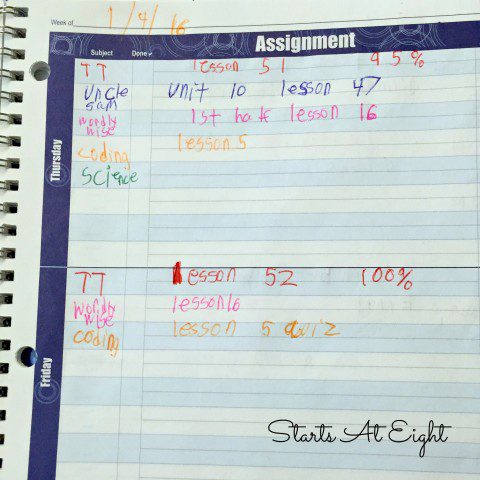
Source: Starts at Eight
- High School: Kids can continue using paper planners, or transition to online calendars or apps. Show them how to set useful reminders online, so things don’t slip through the cracks.
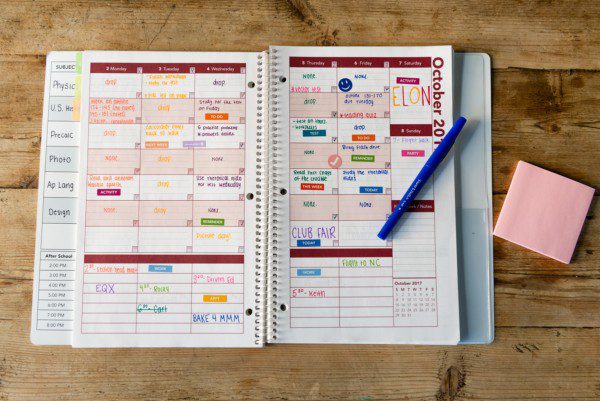
Source: LP Tutoring
Create a Daily Study Plan
When kids sit down to tackle the day’s work, encourage them to begin by making a plan. Assess what needs to be done, estimate the amount of time it will take, and decide what to do first.
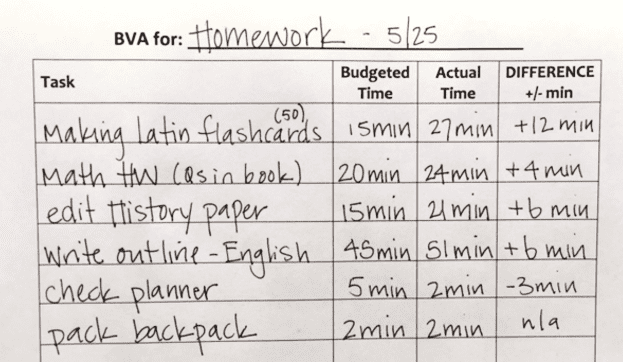
Source: Beyond Booksmart
- Elementary School: Parents and young kids should sit down together to look over the day’s assignments and talk about what to work on first. Some students might like to get easy tasks out of the way before settling in to harder ones, while others prefer to handle more difficult things first. Help them find the method that works best for them.
- Middle School and High School: This age brings a higher amount of homework, so students should always start by determining how much time they’ll need to complete it. Let them experiment a bit—do they work best by completely finishing one assignment before moving on to the next, or do they like to do a little bit of each and take some breaks in between? Over time, they’ll find the methods they like best.
Chose the Best Study Time
Kids’ days are often jam-packed with activities, leaving homework and studying to get squeezed in whenever it fits. Take time to find out what time of day kids are at their best, and prioritize that time for study. For instance, if a student seems to learn better if they do their homework right after school, try to choose extracurriculars that meet in the evenings or weekends instead. Some students might even prefer to get up early in the morning and work, and that’s OK too as long as they’re getting enough sleep.
- Elementary School: Let kids try doing their homework at different times throughout the day, and see if there are times when they’re better at concentrating. If so, teach them to schedule their schoolwork during those times, and make extracurricular choices for them accordingly.
- Middle and High School: Students probably know by now when they work best, but busy schedules can make that more difficult to accommodate. Remind them to try to make smart choices and to tackle schoolwork when they’re feeling as fresh and alert as possible.
Keep Materials Neat and Organized
Some adults thrive in messy work spaces, and that’s OK. But kids should make an effort to keep their spaces and materials organized so they have fewer excuses for not getting things done.
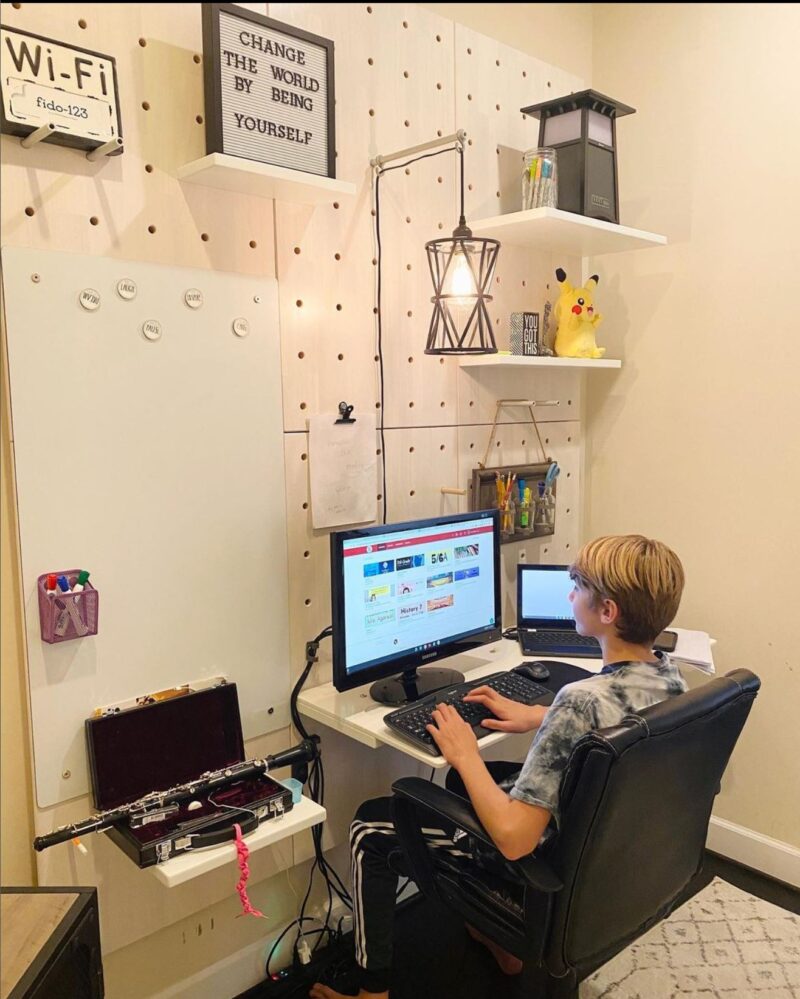
Source: mywallpro/Instagram
- Elementary School: In early grades, parents should help kids go through their backpack each night, cleaning out trash and restocking supplies. Help them set up an organization system using the different pockets. Show them how to use different-color folders and notebooks for each subject, and clean out every folder regularly. Set the backpack by the front door each night so it’s ready to go in the morning. Upper grade students should gradually do some or all of these things on their own.
- Middle School: Transition to entirely managing backpacks and study spaces on their own. Parents might check in once a week or at the beginning of a school quarter to see if students need some assistance getting organized.
- High School: In addition to managing their physical study materials, ensure kids at this age know how to keep things organized online. Show them how to use files and folders, where to back things up, and how to manage their email and message inboxes. Encourage them to set aside a regular time to make sure everything is in order, and make improvements as needed.
Take Breaks
Students need both physical and mental brain breaks while they study! Remind kids to get up and move around regularly, rest their eyes, and give their brain a break for a few minutes every so often.
- Elementary School: Younger students should be able to work for about 15-20 minutes before taking a break, with upper grades going as long as 30 minutes. They usually won’t need reminders to take breaks, but they might need some help keeping those breaks to no more than 10 minutes or so.
- Middle School: These kids can work 30-45 minutes at a time and should learn to recognize the signs of needing a break on their own. When they start to get very fidgety, feel a headache coming on, squint while they’re reading, or feel hungry or thirsty, it’s time for a short break. Teach them to set a timer to know when the break is over and they need to get back to work.
- High School: By now, students can work an hour at a time but should be encouraged to take regular breaks all the same. In fact, just like adults, they should aim to get up and move for at least 5 minutes every hour. Physical activity like stretching, yoga, or even dancing to music will help refresh them so they can get back down to it. If they have trouble remembering to take breaks, have them set a timer to remind them.

All students use different learning methods to retain and understand the same information. Some like written words, some prefer to hear it and talk about it. Others need to do something with their hands or see images and diagrams. These are known as learning styles. While it’s important not to pigeonhole students into any one style, kids should be aware of any strengths they have and use them to create strong study skills.

Source: Nnenna Walters
Know Your Style
There are four generally accepted styles: visual, auditory, read/write, and kinesthetic (movement). You can learn more about them here. It’s worth taking time to understand which (if any) style appeals to a student more.
- Elementary School: Most kids are exposed to a wide array of learning activities, strategies, and methods here and will slowly form preferences. If parents or teachers notice that kids aren’t learning well using one method (e.g., flash cards to learn math facts), have students try activities from different styles instead (like videos or songs).
- Middle School: At this age, students should have some idea of which study methods fit their learning styles. They should continue to experiment, especially in subjects where they struggle to master the material.
- High School: Kids in these grades who still don’t understand how they learn best may benefit from taking the VARK questionnaire . It will point them in the right direction and help them find the best study methods.
Choose Appropriate Study Materials
Here are some examples of study materials and activities that appeal to different learning styles, no matter the age or grade level.
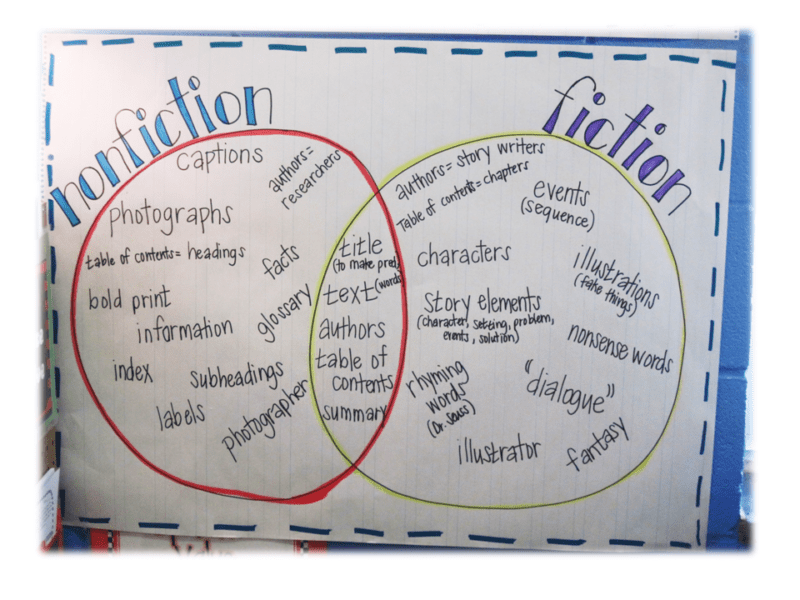
Source: Elementary Shenanigans
- Visual: Diagrams; charts; graphs; maps; videos with or without sound; photos and other images; graphic organizers and sketchnotes
- Auditory: Lectures; audiobooks; videos with sound; music and songs; text-to-speech translation; discussion and debate; teaching others
- Read/Write: Reading textbooks, articles, and handouts; watching video with subtitles turned on; using speech-to-text translation and transcripts; making lists; writing answers to questions
- Kinesthetic: Hands-on practice; educational craft projects; experiments and demonstrations; trial and error; moving and playing games while learning

Study after study have shown the importance of actively taking notes rather than passively reading a handout later on. The act of writing engages different parts of the brain, forging new pathways that help students retain information in long-term memory. Taking good notes and using them properly are study skills every student needs to master.
Learn Different Note-Taking Strategies
There are a variety of good strategies, like outlines, the Cornell Method, sketchnotes, and more. There’s no one best method; it often depends on the material and the learner.
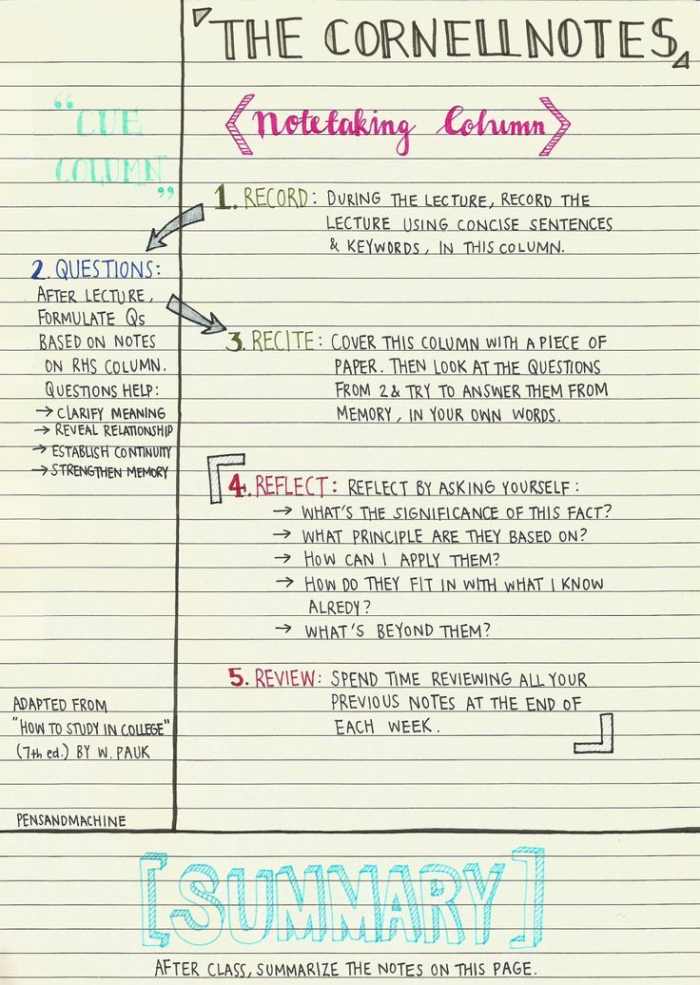
Source: Think Insights
- Elementary School: Actively teach kids how to take notes in a variety of styles. Learn about seven top note-taking strategies here , and share them with your students. Teachers can start with handouts and graphic organizers but should slowly transition to more independent methods.
- Middle School: Students should be mastering the skill of taking their own notes, choosing a style that works best for them. They may need reminders of key points to capture but should now be able to isolate the important info.
- High School: Note-taking should be automatic by now, and many students will have developed preferred styles. Teachers should not insist on a specific note-taking strategy, but should ensure kids are capturing the information they need.
Organize and Review
Taking notes is just one part of the process. Students with good study skills also know how to use them effectively.
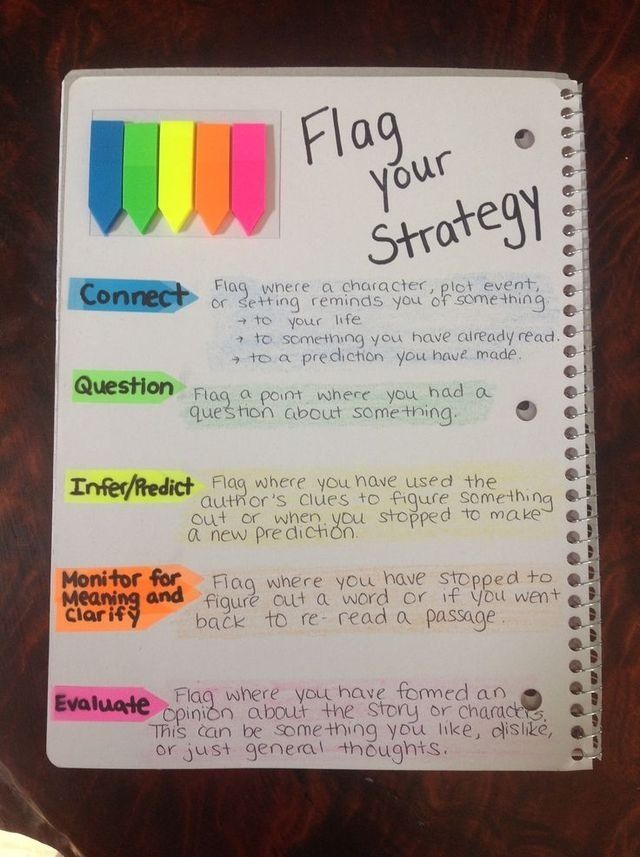
Source: The Mad Scientist
- Elementary School: Help students keep all notes from one subject or project in one notebook or folder. Show them how to place them in an order that makes sense, and use tabs, tables of contents, or other organizational methods. Encourage them to review each day’s notes when they go home at night, to reinforce the learning.
- Middle School: Students in these grades might want to reorganize their notes on their own when they get home, re-copying them or even typing them into a computer. They should be able to use effective organization strategies, to find the notes they need later on during a study session.
- High School: Students should plan to spend time after every class going over that day’s notes, reviewing and reinforcing what they learned. They should be able to rely heavily on their own notes when reviewing for a test or completing a project.

“Read chapter three for homework tonight.” Sounds simple enough, right? But there’s a big difference between skimming the material and actually learning from it. Here are the study skills students need to learn while they read.
Highlighting
Everybody loves a handful of colorful highlighters, but using them effectively is a study skill all on its own. Kids can highlight both texts and their own notes.
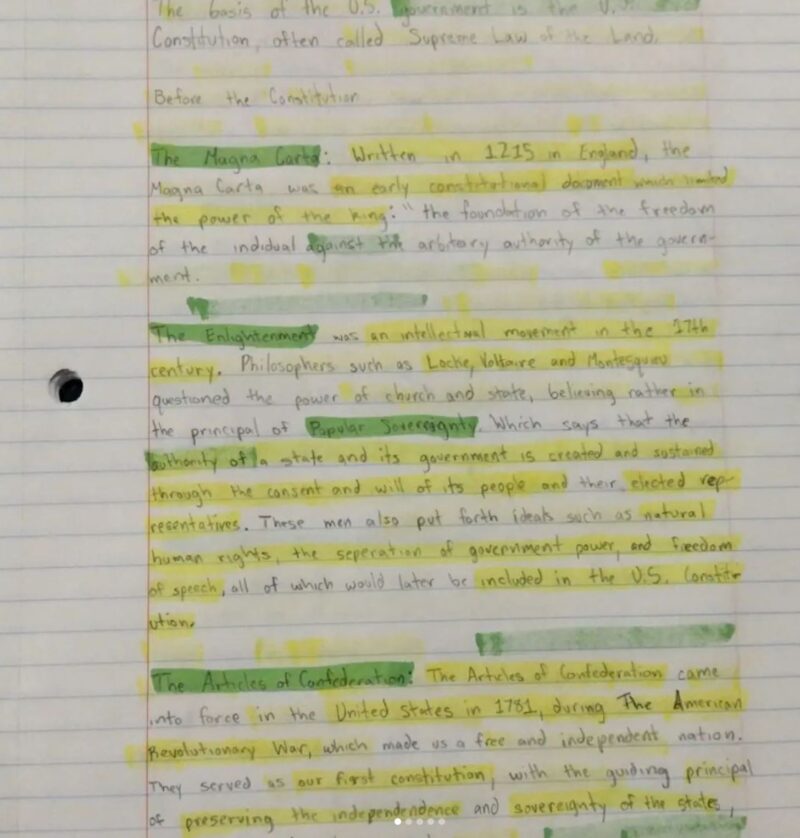
Source: cozmic_mae/Instagram
- Elementary School: Read material with students, showing them how to highlight key words and phrases instead of whole blocks of text. Show them color-coding strategies for organizing the information. Give them practice passages specifically for learning these skills.
- Middle School: Introduce students to online highlighting tools, since many of the texts they’ll be reading are digital. If necessary, they can print out reading material to highlight physically instead.
- High School: Kids should be pretty expert at highlighting by now, but watch for students who are still highlighting whole blocks without really knowing why, and show them the fundamentals.
Rereading and Taking Notes
In a lot of cases, reading something once simply isn’t enough. All students should learn to reread materials, using that time to highlight and take notes.

Source: SERC
- Elementary School: Reread passages together, pointing out key words, phrases, and ideas. Make notes while reading, both in the text and on separate paper. Try to complete review questions without referring to the text.
- Middle School: Students will know they’ve read thoroughly when they can complete review questions without looking back. Show students how to write their own review questions as they study (the Cornell Method of Note-Taking is perfect for this) so they’ll know they truly understand the material.
- High School: Continue to reinforce good reading study skills by giving students review questions to complete or asking them to make an outline or sketchnotes to sum up what they’ve learned.
Kids need to learn how to thoroughly complete an assignment, whether it’s a worksheet, an essay, or a term-long research project. These are the study skills they should know.
Understand the Assignment
Having a clear understanding of what’s being asked is so important. Otherwise, kids might wind up doing the wrong work, then having to tackle it all over again.
- Elementary School: Show kids how to carefully read directions at the beginning. Have them repeat back what they’re expected to do, and make notes if they need reminders. Teachers should provide instructions in writing whenever possible and make them clear and simple.
- Middle School: Encourage students to ask questions about assignments up front, or throughout if necessary. Continue to ensure they fully understand the directions before they start, especially when there are multiple steps.
- High School: By now, students should be able to make their own notes about expectations and can handle a series of more complicated steps. They should make a habit of reviewing all that information before they begin work.
Make a Plan
Once they know the expectations, students should plan how they’ll do the work.
- Elementary School: Help students evaluate the assignment and decide which parts they’ll do first. This is also a good time to estimate how long the work will take.
- Middle School: Encourage kids to think about how they like to approach assignments. Do they like doing easy problems first, then circling back around to harder stuff? Do they sometimes get stuck and frustrated? If so, how can they get “unstuck” and continue to make progress?
- High School: Many high school assignments are more complex, and students will need to lay out the steps to take. For instance, a research project might require choosing a topic, getting approval, starting research, planning a presentation, and giving the presentation, with multiple sub-steps in each. This all feels more manageable when you have a plan in place first.
Save Your Work
Such a basic study skill, and so extremely important!
- Elementary School: Help students ensure all assignments go back into the appropriate folders and all folders make it into their backpack when they’re done. Don’t leave things lying around where they can get lost.
- Middle and High School: In addition to keeping physical papers in order, be sure kids know how to save files online, including backing up their work. Many programs save automatically, but that’s not always the case. Show them how to keep backed-up files on an external drive or in the cloud, in case their hardware fails.
Review and Revise
Finishing the last problem on the page or typing the final word on a paper doesn’t mean you’re done. Good study skills means going back to review your work and make revisions.
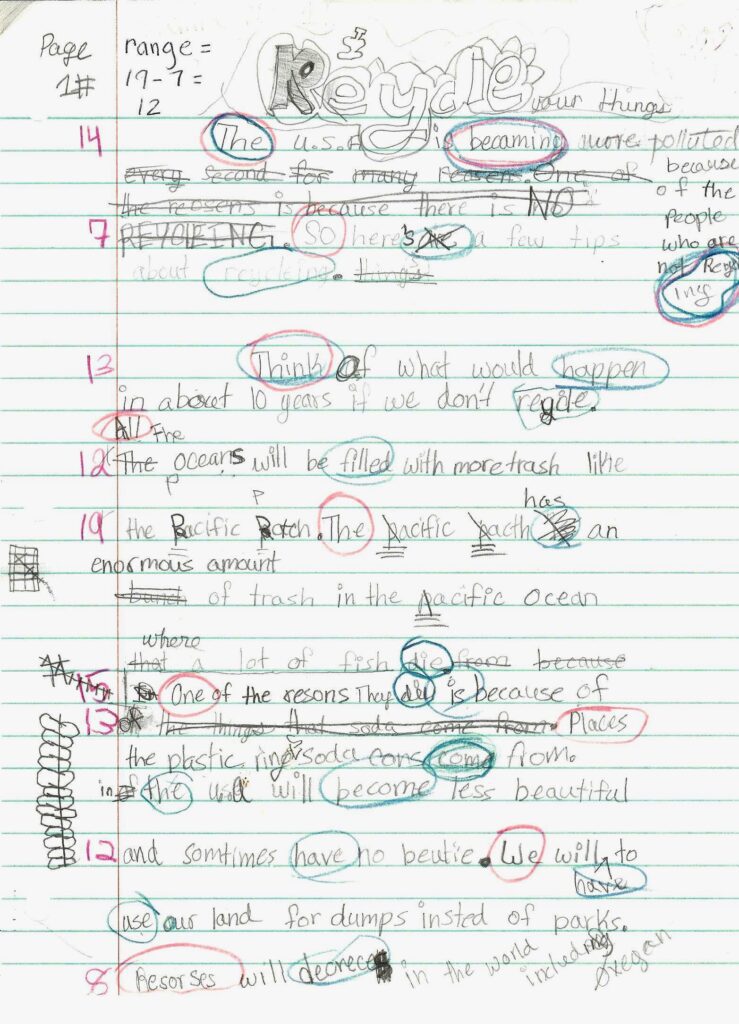
Source: EnglishWritingTeacher.com
- Elementary School: Parents and younger kids should go back over completed homework together to make sure it’s complete and correct. Perform math problems “backwards” to see if the answers make sense. As kids get older, parents should remind them to review and check their answers on their own.
- Middle School: Students should regularly remember to check their answers before turning in an assignment. Advise them to make sure they’ve done everything they’ve been asked to, to the best of their ability.
- High School: Reviewing and revising should be automatic now. Writing assignments should include plans for multiple revisions. Teach students to use spell-check and grammar-check programs as needed, and encourage them to read their writing out loud to hear how it sounds.

Some kids naturally do well on tests, but others freeze up and forget everything they’ve learned . Fortunately, test-taking study skills are something kids can learn over time.
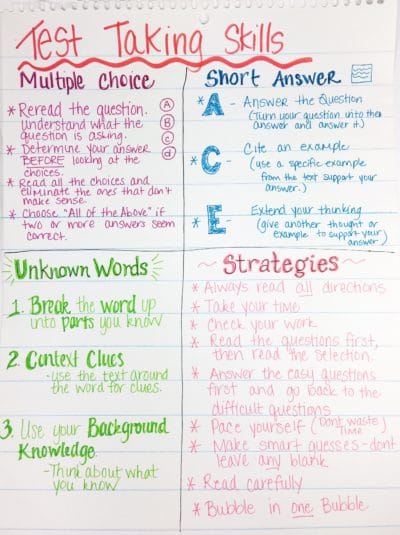
Source: Tammy DeShaw/The Owl Teacher
Review the Material
Kids should develop a variety of strategies for reviewing for a test, including review questions, flash cards, discussions, looking over notes, and more. It’s also important to follow a regular study schedule on any subject, instead of leaving all the review to the last minute.
- Elementary School: Whenever possible, adults should work with kids to help them study. Make flash cards, talk over the material together, sing spelling word songs—model good study skills for them to help them learn.
- Middle School: Help students continue to use a variety of review strategies. Teachers can provide review questions, set up study groups, and create online materials for them to use, just to name a few.
- High School: Kids should be coordinating their own review by now, whether independently or in groups. Make sure they know how to contact you if they have questions while they’re studying.
Get Rest and Eat Well
At any age, feeling your best is key to acing a test. Discourage students from staying up late to cram, and see that they have healthy meals and snacks on the day of the test. If they’re allowed, be sure they have bottled water on hand to stay hydrated before and during the test itself.
Tackle Easy Questions First
This one is especially important for students who have difficulty managing their time, or those who get incredibly nervous about tests. Focus on showing what you know, and build confidence as you go along.
- Elementary School: Teach kids to look over the entire test first so they can see what they’ll be expected to do. Tell them to ask questions right away if they have any. On the second run-through, they should answer any questions or problems they’re certain about. Finally, they can go back and handle more challenging questions, one at a time. In younger grades, practice this skill by using guided test-taking sessions.
- Middle School: Before a test, remind students of the process. Have them look the whole thing over first, and ask if anyone has any general questions before they begin. Monitor kids as they complete the test, and nudge along any who seem stuck on one particular question or section.
- High School: By now, kids should have the process down pat, but teachers should be aware of nervous test-takers and quietly remind them to focus on what they know.
Watch the Time
It’s a simple skill but a valuable one. Get kids used to glancing at the clock, but not obsessing over how much time is left.
- Elementary School: Tell kids how much time they have up front. Offer reminders several times, especially toward the end, but don’t do it in a way that amps up anxiety.
- Middle School: Make time expectations clear up front, and remind students once or twice of the remaining time as they work. Students should be glancing at the clock occasionally as they work; at the end of every page or section is a good rule of thumb. If they feel like they’re running out of time, remind them to use the “easy questions first” strategy.
- High School: Older students should be able to look over a test and compare it to the amount of time they have, so they know they’re working at the right pace. Teachers can offer a reminder halfway through and five minutes before the end.
Review Before Submitting
Just like with assignments, students should try to make time to review test answers before they turn it in. (And to make sure they put their names on their paper!)
- Elementary School: Actively ask students who are turning in their papers to go back to their seats and review their answers first. Build in a little extra test time so every student has a chance to review their work.
- Middle School: Remind students to review their work before submitting it when you pass out the tests. Offer additional reminders to those who regularly turn in work that needed another look.
- High School: Students should remember to build in time to look things over at the end as they start taking the test. The five-minute reminder toward the end is their cue to look over what they’ve done.

Even when you have terrific study skills, sometimes you need some assistance. Asking for help when you need it is something everyone needs to be able to do. While kids can’t expect adults to walk them through every step of the process, they should feel free to reach out for guidance when they need it.
Know How and When To Contact Teachers
Help students keep contact information handy and know the appropriate ways to contact their teachers as needed.
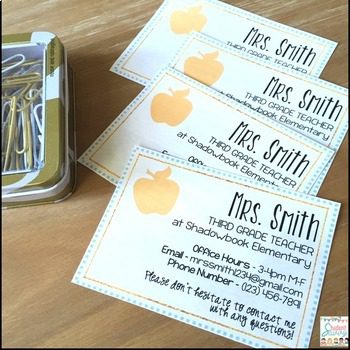
Source: StudentSavvy/Teachers Pay Teachers
- Elementary School: Most outside-school communication is between parents and teachers at this point, but kids should be encouraged to ask their own questions during the school day whenever possible. As they get older, parents should do their best to let kids take the lead.
- Middle School: Students should be almost entirely independent of parents when communicating with teachers now. They should know when teachers are available to chat in person (including before and after school, if possible). Adults can also show them how to write respectful emails or texts if teachers have made that contact information available.
- High School: At this point, students should be nearly 100% responsible for talking to their teachers when they need to. They should keep a contact list of email addresses, phone numbers, or other info. Additionally, they should recognize and respect preferred methods of contact.
Create Study Groups
While some kids work best on their own, many others thrive working with others to keep them on track and motivated. Setting up study buddies or groups enhances everyone’s study skills.
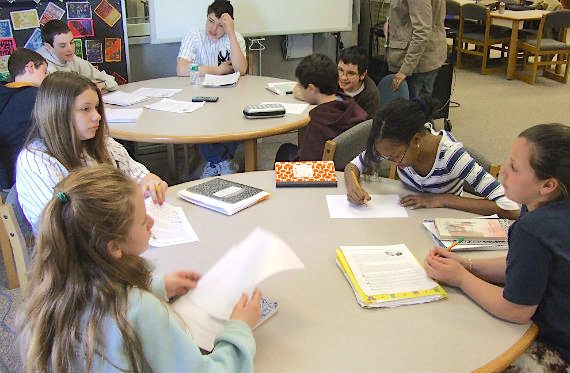
Source: MiddleWeb
- Elementary School: Parents will likely have to coordinate any in-person or online study sessions. Teachers can help by pairing students together as partners or for tutoring, and providing virtual study spaces when necessary.
- Middle School: As students get older, they should learn to seek out strong study partners. Help them recognize that their best friends may not always be the best choices when it comes to studying. Encourage them to have peers over to study, or to meet in public places like libraries.
- High School: Kids should be independently forming their own study support systems. However, they might ask teachers for help when they need one-on-one tutor recommendations. They may work together at school, at home, at the library, or online.
Use Resource Tools
There are more ways to learn and study than ever before. Help students find the right options to support their studies.
- Elementary School: Encourage students to look up answers in the right places: What does a word mean? Check the dictionary. When did the Civil War start? Here’s how to Google that. Help younger students use the resources to ensure they’re finding the information they need.
- Middle School: “Hey Google, how many moons does Jupiter have?” Kids this age know how to ask questions on the web. However, they need to learn how to make sure the answers are reliable. Teach them about primary sources (like following Wikipedia info back to its original source) and how to verify information in several different places.
- High School: A huge number of resources are online these days, so be sure students know where to find them and how to use them. Provide trusted online dictionaries and encyclopedias, show them how to seek out a thesaurus or rhyming dictionary, and guide them to video sites beyond YouTube, just to name a few.
How do you teach study skills in your classroom? Come share your ideas and ask for advice in the WeAreTeachers HELPLINE group on Facebook !
Plus, check out 15 life skills every teen should learn ..

You Might Also Like

26 Important Life Skills for Teens
Why not help your kids build these skills while they’re still at home? Continue Reading
Copyright © 2024. All rights reserved. 5335 Gate Parkway, Jacksonville, FL 32256
Take Control of Homework
Find the right college for you, don't let it control you..
Although very few students love homework, it does serve a purpose. Homework helps you:
- Reinforce what you've learned during the day.
- Build study habits that are essential in college.
- Prepare for your classes.
- Get a sense of progress.
College life involves a lot of adjustments for students. Will you have homework in college? Yes. And it can be one of the most daunting tasks you face there. Out-of-the-classroom learning is part of the college experience and essential for academic success. The good news is that learning some homework tips now will make it easier to do college homework later.
Set the Mood.
Create a good study area with everything you need (e.g., a calculator). If you don't have a quiet place at home, try your local library.
Know Where to Begin.
Make a list of everything you need to do. Note all deadlines. Do the more challenging assignments first so you don't have to face them at the end.
Study at the Same Time Every Day.
Even if you don't have homework every night, use the time to review notes. If sitting down to work is part of your everyday routine, you'll approach it with less dread. Also, you'll become a pro at using time productively.
Keep Things in Perspective.
Know how much weight each assignment or test carries. Use your time accordingly.
Get More Involved.
Keep your mind from wandering by taking notes, underlining sections, discussing topics with others, or relating your homework to something you're studying in another class.
Organize the Information.
People process information in different ways. Some people like to draw pictures or charts to digest information, while others prefer to read aloud or make detailed outlines. Try to find the methods that work best for you. Ask your teacher for recommendations if you're having trouble.
Take Advantage of Any Free Time.
If you have a study period or a long bus ride, use the time to review notes, prepare for an upcoming class, or start your homework.
Study with a Friend.
Get together with friends and classmates to quiz each other, compare notes, and predict test questions. Consider joining a study group.
Communicate.
If you have concerns about the amount or type of homework, talk to your family, teachers, or counselor. They can help you understand how much time you need to allot for homework and how to manage your tasks.
Celebrate Your Achievements.
Reward yourself for hitting milestones or doing something unusually well.
Related Articles

ChatGPT for Teachers
Trauma-informed practices in schools, teacher well-being, cultivating diversity, equity, & inclusion, integrating technology in the classroom, social-emotional development, covid-19 resources, invest in resilience: summer toolkit, civics & resilience, all toolkits, degree programs, trauma-informed professional development, teacher licensure & certification, how to become - career information, classroom management, instructional design, lifestyle & self-care, online higher ed teaching, current events, homework helps high school students most — but it must be purposeful.

Researchers make a strong case for the value of homework for high school students.

During the high school years, many students participate in extracurricular activities or take on part-time jobs — responsibilities that leave little time for families to connect, which remains important for this age group. Advocates for less-intense homework policies maintain that students should be able to balance school, activities and family life.
Homework helps high school students — but how much do they need?
High school students are better able to manage their time, stay focused and complete complex tasks, which enables them to tap the value of homework. In high school, the 10-minute per grade level rule still applies (students should receive 10 minutes of homework per night based on the grade level they are in). This rule allows up to 120 minutes of homework in the evening for upper-level students. While students occasionally need to do more than two hours of work a night, this should be the exception rather than the rule. Research shows that completing more than this amount of homework results in no further gains.
There is, however, a larger spread in the amount of homework students do each night, even among those at the same grade level. As students get further along in high school, they can select the rigor of their curriculum. Those who pursue higher-level work, such as AP, honors or college-level courses, will do more homework each night than those who have a less-rigorous course load. Still, students shouldn’t be assigned more than two hours of homework a night on average.
High school students need real work, not busy work
Researchers agree that homework should serve a specific developmental or educational purpose. High school students should not get the impression their homework is just busy work; that increases resentment and reduces the likelihood they’ll see homework as crucial to their education.
The goal of homework, especially in the high school years, is for students to spend more time studying a subject and engaging in the curriculum — assuming the homework is designed to be meaningful and engaging rather than passive activities that don’t truly engage or promote understanding of new concepts. Purposeful homework should give students a deeper understanding of content and allow them to practice skills that they can master independently.
While some researchers suggest reducing homework for high school students, most researchers agree that homework at this age level is important because it has been positively linked to academic achievement. Yet it’s important to remember that the amount and type of homework matters, and teachers should strive to give less homework when possible so long as it promotes academic excellence.
Caitrin Blake has a BA in English and Sociology from the University of Vermont and a master’s degree in English literature from the University of Colorado Denver. She teaches composition at Arapahoe Community College.
You may also like to read
- Websites that Help Students with High School Math
- 5 Educational Apps for High School Students
- How to Help High School Students with Career Research
- Building Math Skills in High School Students
- Spanish Class Project Ideas for High School Students
- Inspiring High School Students To Read African American Literature

Categorized as: Tips for Teachers and Classroom Resources
Tagged as: High School (Grades: 9-12) , Professional Development
- Master's in Education Policy
- Online & Campus Doctorate (EdD) in Higher Edu...
- Certificates in Administrative Leadership
Our websites may use cookies to personalize and enhance your experience. By continuing without changing your cookie settings, you agree to this collection. For more information, please see our University Websites Privacy Notice .
Neag School of Education
How to use homework to support student success.
- by: Sandra Chafouleas
- January 13, 2022
- Community Engagement

Editor’s Note: Board of Trustees Distinguished Professor Sandra Chafouleas shares insights on supporting students’ homework during the pandemic in the following piece, which originally appeared in Psychology Today , where she publishes a blog.
COVID has brought many changes in education. What does it mean for homework?
School assignments that a student is expected to do outside of the regular school day—that’s homework. The general guideline is 10 minutes of nightly homework per grade level beginning after kindergarten. This amounts to just a few minutes for younger elementary students to up to 2 hours for high school students.
The guidance seems straightforward enough, so why is homework such a controversial topic? School disruptions, including extended periods of remote learning during the COVID-19 pandemic, have magnified the controversies yet also have provided an opportunity to rethink the purpose and value of homework.
Debates about the value of homework center around two primary issues: amount and inequity.
First, the amount of assigned homework may be much more than the recommended guidelines. Families report their children are stressed out over the time spent doing homework. Too much homework can challenge well-being given the restricted time available for sleep, exercise, and social connection. In a 2015 study , for example, parents reported their early elementary children received almost three times the recommended guidelines. In high school, researchers found an average of three hours of homework per night for students living in economically privileged communities.
“ Debates about the value of homework center around two primary issues: amount and inequity.”
Second, homework can perpetuate inequities. Students attending school in less economically privileged communities may receive little to no homework, or have difficulty completing it due to limited access to needed technology. This can translate into fewer opportunities to learn and may contribute to gaps in achievement.
There isn’t a ton of research on the effects of homework, and available studies certainly do not provide a simple answer. For example, a 2006 synthesis of studies suggested a positive influence between homework completion and academic achievement for middle and high school students. Supporters also point out that homework offers additional opportunities to engage in learning and that it can foster independent learning habits such as planning and a sense of responsibility. A more recent study involving 13-year-old students in Spain found higher test scores for those who were regularly assigned homework in math and science, with an optimal time around one hour—which is roughly aligned with recommendations. However, the researchers noted that ability to independently do the work, student effort, and prior achievement were more important contributors than time spent.
Opponents of homework maintain that the academic benefit does not outweigh the toll on well-being. Researchers have observed student stress, physical health problems, and lack of life balance, especially when the time spent goes over the recommended guidelines. In a survey of adolescents , over half reported the amount and type of homework they received to be a primary source of stress in their lives. In addition, vast differences exist in access and availability of supports, such as internet connection, adult assistance, or even a place to call home, as 1.5 million children experience homelessness in the United States
The COVID-19 pandemic has re-energized discussion about homework practices, with the goal to advance recommendations about how, when, and with whom it can be best used. Here’s a summary of key strategies:
Strategies for Educators
Make sure the tasks are meaningful and matched..
First, the motto “ quality over quantity ” can guide decisions about homework. Homework is not busy-work, and instead should get students excited about learning. Emphasize activities that facilitate choice and interest to extend learning, like choose your own reading adventure or math games. Second, each student should be able to complete homework independently with success. Think about Goldilocks: To be effective, assignments should be just right for each learner. One example of how do this efficiently is through online learning platforms that can efficiently adjust to skill level and can be completed in a reasonable amount of time.
Ensure access to resources for task completion.
One step toward equity is to ensure access to necessary resources such as time, space, and materials. Teach students about preparing for homework success, allocating classroom time to model and practice good study habits such as setting up their physical environment, time management, and chunking tasks. Engage in conversations with students and families to problem-solve challenges When needed, connect students with homework supports available through after-school clubs, other community supports, or even within a dedicated block during the school day.
Be open to revisiting homework policies and practices.
The days of penalizing students for not completing homework should be long gone. Homework is a tool for practicing content and learning self-management. With that in mind, provide opportunities for students to communicate needs, and respond by revising assignments or allowing them to turn in on alternative dates. Engage in adult professional learning about high-quality homework , from value (Should I assign this task?) to evaluation (How should this be graded? Did that homework assignment result in expected outcomes?). Monitor how things are going by looking at completion rates and by asking students for their feedback. Be willing to adapt the homework schedule or expectations based on what is learned.
Strategies for Families
Understand how to be a good helper..
When designed appropriately, students should be able to complete homework with independence. Limit homework wars by working to be a good helper. Hovering, micromanaging, or doing homework for them may be easiest in the moment but does not help build their independence. Be a good helper by asking guiding questions, providing hints, or checking for understanding. Focus your assistance on setting up structures for homework success, like space and time.
Use homework as a tool for communication.
Use homework as a vehicle to foster family-school communication. Families can use homework as an opportunity to open conversations about specific assignments or classes, peer relationships, or even sleep quality that may be impacting student success. For younger students, using a daily or weekly home-school notebook or planner can be one way to share information. For older students, help them practice communicating their needs and provide support as needed.
Make sure to balance wellness.
Like adults, children need a healthy work-life balance. Positive social connection and engagement in pleasurable activities are important core principles to foster well-being . Monitor the load of homework and other structured activities to make sure there is time in the daily routine for play. Play can mean different things to different children: getting outside, reading for pleasure, and yes, even gaming. Just try to ensure that activities include a mix of health-focused activities such as physical movement or mindfulness downtime.

The Council for the Accreditation of Educator Preparation (CAEP) accredits the Neag School of Education at the University of Connecticut. Read more about CAEP Accreditation, including the programs covered and the accountability measures .
Some content on this website may require the use of a plug-in, such as Adobe Acrobat Viewer .
- Support the Neag School
Neag School of Education 249 Glenbrook Road, Unit 3064 Charles B. Gentry Building Storrs, CT 06269-3064
860-486-3815 [email protected]
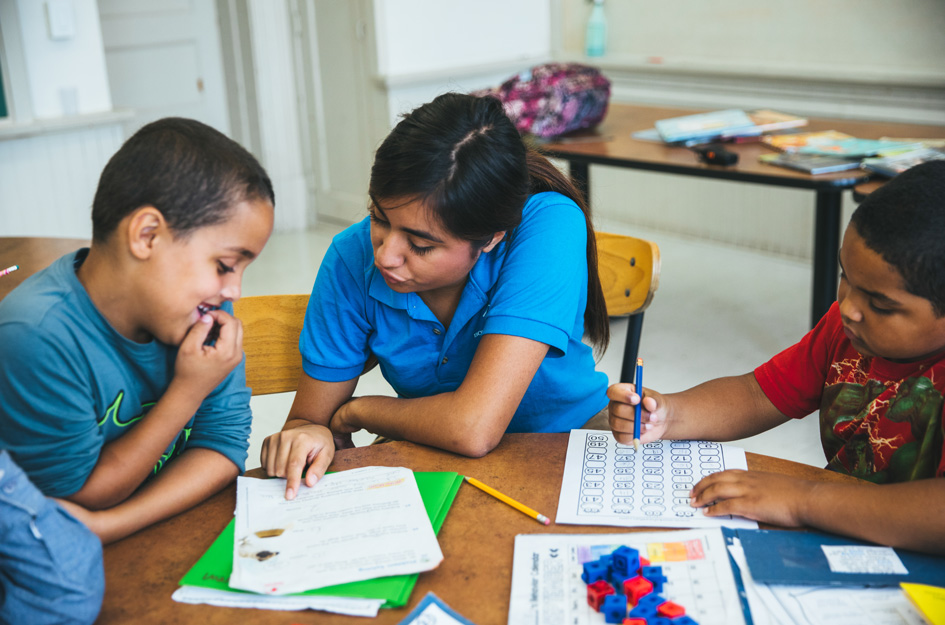
Making School Fun at Home
This article was previously published on 7/30/2019.
12 Ways to Make School Fun at Home for Students of All Ages
Back to school will look different this year as families and schools continue to navigate the uncertainty of COVID-19. Getting kids to enjoy (or even accept) doing their homework can be a struggle at any age, especially in the fall when students adjust to smaller classes, alternate schedules and a continuation of virtual learning that began in the spring.
For some families, new ways of learning are further complicated by parents’ work schedules and a lack of technology access. According to the Afterschool Alliance, 1 in 5 kids are unsupervised after the school day ends. And millions of families don’t have internet access at home.
During challenging times and busy parenting schedules, there are still ways to make learning at home fun, safe and constructive for students. Over the years, our trained youth mentors and program facilitators have developed lots of strategies and ideas to make homework more fun. Get tips on how to make virtual learning and homework fun in high school, middle school and elementary school so you can help your kid succeed at every age.
Ideas to Make Homework Fun for Elementary, Middle and High Schoolers
Many kids find homework assignments boring or simply get restless when asked to sit down and study – but that doesn’t mean they all need the same kind of motivation. Avoid a one-size-fits-all approach to homework help by using these age-appropriate tips.

Elementary School Homework Tips
Little kids frequently have trouble focusing on virtual learning and homework, especially when there are so many distractions and fun things to play with at home. The solution? Make learning more like playtime.
- Create fun focus spaces. Kids often work on homework in their rooms or wherever there’s a little spare table space – but kids’ rooms and common areas are usually filled with distractions. Before this school year starts, create a special “homework zone” in part of the home that’s more peaceful. (A “homework fort” is always a hit with young kids, as long as it’s well lit.) Stock this area with lots of colorful school supplies so there’s no reason to leave until their homework is all done.
- Beat the clock. Young kids love racing to the finish. Make homework more like a race by setting up timed challenges. For example, count how many words they can spell correctly or math problems they can solve in the span of 5 minutes. The next day, challenge your kid to beat their own record. (A little competition can work great with siblings, too.)
- Try learning apps. Support the subjects your kid studies in school with apps that make learning about it more fun. This tip is especially helpful for subjects that you or your kid struggle with. Some of our favorite educational apps include DragonBox for math, Spelling Stage for spelling, and DuoLingo , which offers learning-based games in Spanish, French and many other languages.
- Team up with tunes. Just like the Alphabet Song teaches kids their ABCs, there are plenty of songs out there to help specific subjects stick. Search YouTube to find songs covering a range of subjects, including the planets in our solar system, the days of the week and months of the year, U.S. states and capitals, how to add or subtract, and pretty much any other educational topic you can imagine. If you can’t find a song on a given subject, try making one up together.
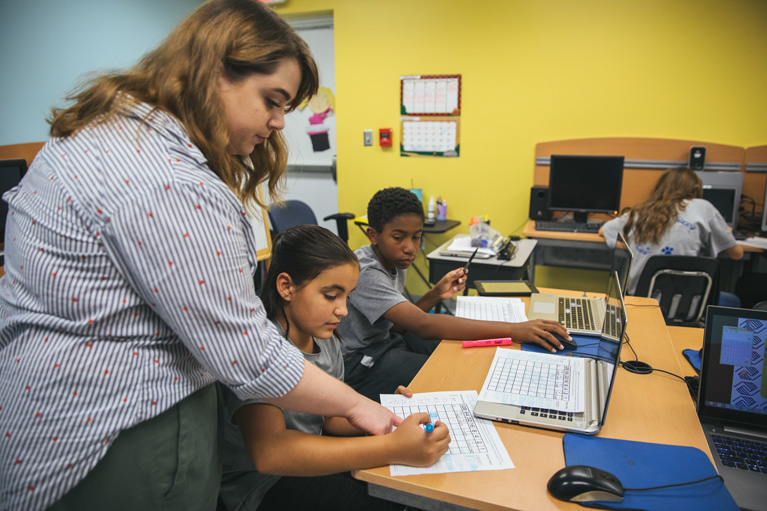
Middle School Homework Tips
In middle school, students gain more independence to work alone or with peers. Encourage their developing maturity with a little structure and loads of support.
- Use power hours. Power hours challenge kids to focus for a certain amount of time. Once the timer goes off, they can take a quick break before diving in again. Offering little rewards after productive power hour sessions is a great incentive at this age, too.
- Plan study dates. If your kid struggles in a certain subject or has trouble focusing in a quiet, empty room, let them invite a friend or two over to study. Just remember to follow current safety and social distancing guidelines. If another kid is too much of a distraction, set the tone by working alongside your child. While they do homework, you can pay bills, make dinner, reply to emails, or even work on a crossword puzzle or another brain game. Doing “adult homework” creates a sense of companionship without being too overbearing – and it can help kids learn that work is a part of life, not just a part of school.
- Make a routine. Lack of routine can be stressful for kids. Setting a regular schedule for homework, or the school day for kids learning at home, can help reduce resistance and improve consistency. Beyond planning time for homework, come up with other little rituals that can help your kid focus, from putting on their current favorite album in the background to using prizes and other incentives to reward good work, like a small treat for every complete assignment.
- Stay positive. Your attitude has a huge impact on how your kid sees the world, especially in the formative middle school years. Keep tabs on your own attitude toward your kid’s homework. If you see helping your kid with homework as a chore, your kid will probably feel that way about it, too. Instead, try to see homework help as a fun, productive time when you both can learn and hang out together.

High School Homework Tips
When students reach high school, having parents hanging around to nag them about homework doesn’t always help. Instead of implementing these homework strategies for high schoolers yourself, show this list to your teenager and help them come up with a plan they can stick to. Then, take a step back. Check in with your teen every week or so to see if their plan needs tweaking.
- Get organized . High school is the perfect time to start preparing for the life you want to lead after you leave home. To achieve your goals, you have to make plans and stick to them. It’s the same with homework. When you get your assignments for the week, month or semester, take some time before jumping in to sort through the deadlines and requirements. Then, come up with a schedule and a realistic plan of attack. Use a day planner, calendar app, or time management app like Asana to make to-do lists for yourself – trust us, it feels great to cross stuff off your list.
- Reward yourself . It’s easier to work hard when you know there’s a reward at the end of it. Set a study timer, and if you’ve focused on homework until the timer goes off, reward yourself with a favorite snack, a funny video, an epic solo dance party or a little social media time.
- Upgrade your workspace. Spruce up the place you do virtual learning and homework to fuel your productivity, imagination and problem-solving skills. Keep tools and supplies on hand to help you work through challenging assignments, like colorful pens, highlighters, sticky notes, and cool notepads or notebooks. Decorate with art and other objects that inspire you, and use calendars, whiteboards, chalkboards, corkboards, or even just paper and tape to help visualize and keep track of everything you have to do.
- Turn up the beats. Spotify has tons of playlists dedicated to productivity, from ambient noise to instrumental hip-hop. Find a few go-to playlists that help keep you focused and put one on whenever you have to zone in. Explore movie soundtracks and other kinds of instrumental music to avoid distracting lyrics.
Homework Help from BGCA
Every day, thousands of kids and parents rely on Boys & Girls Clubs of America for homework help and out-of-school support, especially in the crucial hours after school lets out and during the summer months. Explore our website to learn more about our programs , find your nearest club or support BGCA today.
STAY INFORMED WITH NEWS & UPDATES
- Book Lists by Age
- Book Lists by Category
- Reading Resources
- Language & Speech
- Raise a Reader Blog
- Back to School
- Success Guides by Grade
- Homework Help
- Social & Emotional Learning
- Activities for Kids
9 Smart Tips for Homework Success
Help kids manage their homework load with these strategies..
Even children who enjoy doing homework can lose their enthusiasm for it over the course of the school year, and find ways to stall or avoid doing it. But after-school study time is important, both for reinforcing the day’s learning and for lending structure to your child’s day.
“Homework isn’t just about academics,” says Karen Burke, SVP of Data Analysis and Academic Planning, Scholastic Education Solutions. “It can help students create routines and build responsible behaviors.”
Playing cop rarely works — micromanaging and nagging only make kids feel incapable or frustrated. Instead, think of yourself as a coach and cheerleader.
“Generally, the idea of homework should be to help students set goals, build independence, and practice applying the knowledge they are gaining,” says Burke.
To help you get there, we asked teachers and parents to share their strategies for solving the most common homework struggles. These 10 tips will bring harmony back into your homework routine, whether your child is a kindergartner or 5th grader, perfectionist or procrastinator.
1. Do It Early
Give your child a time frame in which to get down to business. In your household, this may be before or after extracurriculars.
Work with your child to identify the time when their energy and focus are at their peak. This gives your child some control over their schedule. (Some kids need a longer break after school, and others need to start right away to keep the momentum going.)
However, plan on 5 p.m. being the latest they can start their homework.
2. Phone a Friend
From kindergarten onward, kids should have a list of three or four classmates they can call on when they forget an assignment, or even just to ask a question. Study buddies can provide motivation for each other to get the work done.
3. Collaborate to Build Confidence
When kids don’t understand a concept right away, they may feel like they’re not smart enough and start to shut down, says Sigrid Grace, a 2nd grade teacher in Michigan.
Short-circuit negative thinking by sitting down with your child and figuring out the first problem in the assignment together. This should help jog their memory to complete the rest. Then, heap on the praise: “You did a great job on that one! Try the next one now.”
4. Change the Scenery
Sometimes something as simple as changing up their workspace can boost a child’s motivation and, in turn, their confidence. If your child has been working alone at a desk or designated study nook, perhaps they’d be more comfortable doing their homework in a public area, like the kitchen table while you’re preparing dinner.
Conversely, if they’ve been working in a high-traffic part of the house, they might need a more private space in which to focus.
5. Keep the Positive Feedback Coming
Younger kids need instant feedback, so it’s okay for parents of young grade-schoolers to correct mistakes, says Grace, the 2nd grade teacher. Follow this up with specific praise about what your child has done well.
6. Leave the Room
“Kids who drag things out are often doing so for your attention — they’re enjoying the interaction on some level,” explains Grace. “Avoid joining in.”
If you must stay in the room, have your child work in a spot that’s farther away from whatever you’re doing.
7. Beat the Clock
Sometimes procrastinators just need a jump-start. If that’s true for your child, try this:
Set a timer for five minutes and have your child work as quickly and steadily as they can until the timer goes off. At that point, they can choose to take a short break or keep going — many kids continue.
“Racing against a timer gives kids an external sense of urgency if they don’t have an internal one,” says Ann Dolin, a former educator.
However, a timed work session is not an excuse for sloppy work. Make sure your child reviews theirs before submitting it.
8. Plan, Plan, Plan
To get the most out of your days, include every appointment — from sports practice to meals to reading time — on a big calendar or schedule log and stick it in a central place where every member of the household can see it.
If you know that certain nights present a conflict with your child’s homework schedule, you can ask for the week’s assignments upfront and work with your child to decide the best times to complete them, says Cathy Vatterott, a professor of education at the University of Missouri-St. Louis.
“Teachers will often work with you on this, but most parents are afraid to ask,” she says.
9. Let ’Em Vent
If your child is resisting doing their homework — or worse, is tearing up over it in frustration — soothe any pent-up worries by letting them complain. Listen, empathize (“Wow, that is a lot of work”), and state their feelings back to them (“You sound upset”).
Once your child feels understood, they’ll be more likely to accept your suggestions, says Dolin — and better able to focus on what needs to be done.
You can also help by talking to your child about what they remember from class and steering them to the textbook. If they’re still lost, have them write a note to the teacher explaining that they don’t understand.
Get ready for your child to go back to school with our guide — it's full of recommended books, tips to help if your child is struggling with homework , and more resources for starting the year off right .
Shop workbooks and learning kits to support good homework habits. You can find all books and activities at The Scholastic Store .
Sign Up and Get 10% Off Books!
- Our Mission

What’s the Right Amount of Homework?
Decades of research show that homework has some benefits, especially for students in middle and high school—but there are risks to assigning too much.
Many teachers and parents believe that homework helps students build study skills and review concepts learned in class. Others see homework as disruptive and unnecessary, leading to burnout and turning kids off to school. Decades of research show that the issue is more nuanced and complex than most people think: Homework is beneficial, but only to a degree. Students in high school gain the most, while younger kids benefit much less.
The National PTA and the National Education Association support the “ 10-minute homework guideline ”—a nightly 10 minutes of homework per grade level. But many teachers and parents are quick to point out that what matters is the quality of the homework assigned and how well it meets students’ needs, not the amount of time spent on it.
The guideline doesn’t account for students who may need to spend more—or less—time on assignments. In class, teachers can make adjustments to support struggling students, but at home, an assignment that takes one student 30 minutes to complete may take another twice as much time—often for reasons beyond their control. And homework can widen the achievement gap, putting students from low-income households and students with learning disabilities at a disadvantage.
However, the 10-minute guideline is useful in setting a limit: When kids spend too much time on homework, there are real consequences to consider.
Small Benefits for Elementary Students
As young children begin school, the focus should be on cultivating a love of learning, and assigning too much homework can undermine that goal. And young students often don’t have the study skills to benefit fully from homework, so it may be a poor use of time (Cooper, 1989 ; Cooper et al., 2006 ; Marzano & Pickering, 2007 ). A more effective activity may be nightly reading, especially if parents are involved. The benefits of reading are clear: If students aren’t proficient readers by the end of third grade, they’re less likely to succeed academically and graduate from high school (Fiester, 2013 ).
For second-grade teacher Jacqueline Fiorentino, the minor benefits of homework did not outweigh the potential drawback of turning young children against school at an early age, so she experimented with dropping mandatory homework. “Something surprising happened: They started doing more work at home,” Fiorentino writes . “This inspiring group of 8-year-olds used their newfound free time to explore subjects and topics of interest to them.” She encouraged her students to read at home and offered optional homework to extend classroom lessons and help them review material.
Moderate Benefits for Middle School Students
As students mature and develop the study skills necessary to delve deeply into a topic—and to retain what they learn—they also benefit more from homework. Nightly assignments can help prepare them for scholarly work, and research shows that homework can have moderate benefits for middle school students (Cooper et al., 2006 ). Recent research also shows that online math homework, which can be designed to adapt to students’ levels of understanding, can significantly boost test scores (Roschelle et al., 2016 ).
There are risks to assigning too much, however: A 2015 study found that when middle school students were assigned more than 90 to 100 minutes of daily homework, their math and science test scores began to decline (Fernández-Alonso, Suárez-Álvarez, & Muñiz, 2015 ). Crossing that upper limit can drain student motivation and focus. The researchers recommend that “homework should present a certain level of challenge or difficulty, without being so challenging that it discourages effort.” Teachers should avoid low-effort, repetitive assignments, and assign homework “with the aim of instilling work habits and promoting autonomous, self-directed learning.”
In other words, it’s the quality of homework that matters, not the quantity. Brian Sztabnik, a veteran middle and high school English teacher, suggests that teachers take a step back and ask themselves these five questions :
- How long will it take to complete?
- Have all learners been considered?
- Will an assignment encourage future success?
- Will an assignment place material in a context the classroom cannot?
- Does an assignment offer support when a teacher is not there?
More Benefits for High School Students, but Risks as Well
By the time they reach high school, students should be well on their way to becoming independent learners, so homework does provide a boost to learning at this age, as long as it isn’t overwhelming (Cooper et al., 2006 ; Marzano & Pickering, 2007 ). When students spend too much time on homework—more than two hours each night—it takes up valuable time to rest and spend time with family and friends. A 2013 study found that high school students can experience serious mental and physical health problems, from higher stress levels to sleep deprivation, when assigned too much homework (Galloway, Conner, & Pope, 2013 ).
Homework in high school should always relate to the lesson and be doable without any assistance, and feedback should be clear and explicit.
Teachers should also keep in mind that not all students have equal opportunities to finish their homework at home, so incomplete homework may not be a true reflection of their learning—it may be more a result of issues they face outside of school. They may be hindered by issues such as lack of a quiet space at home, resources such as a computer or broadband connectivity, or parental support (OECD, 2014 ). In such cases, giving low homework scores may be unfair.
Since the quantities of time discussed here are totals, teachers in middle and high school should be aware of how much homework other teachers are assigning. It may seem reasonable to assign 30 minutes of daily homework, but across six subjects, that’s three hours—far above a reasonable amount even for a high school senior. Psychologist Maurice Elias sees this as a common mistake: Individual teachers create homework policies that in aggregate can overwhelm students. He suggests that teachers work together to develop a school-wide homework policy and make it a key topic of back-to-school night and the first parent-teacher conferences of the school year.
Parents Play a Key Role
Homework can be a powerful tool to help parents become more involved in their child’s learning (Walker et al., 2004 ). It can provide insights into a child’s strengths and interests, and can also encourage conversations about a child’s life at school. If a parent has positive attitudes toward homework, their children are more likely to share those same values, promoting academic success.
But it’s also possible for parents to be overbearing, putting too much emphasis on test scores or grades, which can be disruptive for children (Madjar, Shklar, & Moshe, 2015 ). Parents should avoid being overly intrusive or controlling—students report feeling less motivated to learn when they don’t have enough space and autonomy to do their homework (Orkin, May, & Wolf, 2017 ; Patall, Cooper, & Robinson, 2008 ; Silinskas & Kikas, 2017 ). So while homework can encourage parents to be more involved with their kids, it’s important to not make it a source of conflict.
This site uses various technologies, as described in our Privacy Policy, for personalization, measuring website use/performance, and targeted advertising, which may include storing and sharing information about your site visit with third parties. By continuing to use this website you consent to our Privacy Policy and Terms of Use .
COVID-19 Update: To help students through this crisis, The Princeton Review will continue our "Enroll with Confidence" refund policies. For full details, please click here.
Enter your email to unlock an extra $25 off an SAT or ACT program!
By submitting my email address. i certify that i am 13 years of age or older, agree to recieve marketing email messages from the princeton review, and agree to terms of use., homework wars: high school workloads, student stress, and how parents can help.

Studies of typical homework loads vary : In one, a Stanford researcher found that more than two hours of homework a night may be counterproductive. The research , conducted among students from 10 high-performing high schools in upper-middle-class California communities, found that too much homework resulted in stress, physical health problems and a general lack of balance.
Additionally, the 2014 Brown Center Report on American Education , found that with the exception of nine-year-olds, the amount of homework schools assign has remained relatively unchanged since 1984, meaning even those in charge of the curricula don't see a need for adding more to that workload.
But student experiences don’t always match these results. On our own Student Life in America survey, over 50% of students reported feeling stressed, 25% reported that homework was their biggest source of stress, and on average teens are spending one-third of their study time feeling stressed, anxious, or stuck.
The disparity can be explained in one of the conclusions regarding the Brown Report:
Of the three age groups, 17-year-olds have the most bifurcated distribution of the homework burden. They have the largest percentage of kids with no homework (especially when the homework shirkers are added in) and the largest percentage with more than two hours.
So what does that mean for parents who still endure the homework wars at home?
Read More: Teaching Your Kids How To Deal with School Stress
It means that sometimes kids who are on a rigorous college-prep track, probably are receiving more homework, but the statistics are melding it with the kids who are receiving no homework. And on our survey, 64% of students reported that their parents couldn’t help them with their work. This is where the real homework wars lie—not just the amount, but the ability to successfully complete assignments and feel success.
Parents want to figure out how to help their children manage their homework stress and learn the material.
Our Top 4 Tips for Ending Homework Wars
1. have a routine..
Every parenting advice article you will ever read emphasizes the importance of a routine. There’s a reason for that: it works. A routine helps put order into an often disorderly world. It removes the thinking and arguing and “when should I start?” because that decision has already been made. While routines must be flexible to accommodate soccer practice on Tuesday and volunteer work on Thursday, knowing in general when and where you, or your child, will do homework literally removes half the battle.
2. Have a battle plan.
Overwhelmed students look at a mountain of homework and think “insurmountable.” But parents can look at it with an outsider’s perspective and help them plan. Put in an extra hour Monday when you don’t have soccer. Prepare for the AP Chem test on Friday a little at a time each evening so Thursday doesn’t loom as a scary study night (consistency and repetition will also help lock the information in your brain). Start reading the book for your English report so that it’s underway. Go ahead and write a few sentences, so you don’t have a blank page staring at you. Knowing what the week will look like helps you keep calm and carry on.
3. Don’t be afraid to call in reserves.
You can’t outsource the “battle” but you can outsource the help ! We find that kids just do better having someone other than their parents help them —and sometimes even parents with the best of intentions aren’t equipped to wrestle with complicated physics problem. At The Princeton Review, we specialize in making homework time less stressful. Our tutors are available 24/7 to work one-to-one in an online classroom with a chat feature, interactive whiteboard, and the file sharing tool, where students can share their most challenging assignments.
4. Celebrate victories—and know when to surrender.
Students and parents can review completed assignments together at the end of the night -- acknowledging even small wins helps build a sense of accomplishment. If you’ve been through a particularly tough battle, you’ll also want to reach reach a cease-fire before hitting your bunk. A war ends when one person disengages. At some point, after parents have provided a listening ear, planning, and support, they have to let natural consequences take their course. And taking a step back--and removing any pressure a parent may be inadvertently creating--can be just what’s needed.
Stuck on homework?
Try an online tutoring session with one of our experts, and get homework help in 40+ subjects.
Try a Free Session

Explore Colleges For You
Connect with our featured colleges to find schools that both match your interests and are looking for students like you.

Career Quiz
Take our short quiz to learn which is the right career for you.

Get Started on Athletic Scholarships & Recruiting!
Join athletes who were discovered, recruited & often received scholarships after connecting with NCSA's 42,000 strong network of coaches.

Best 389 Colleges
165,000 students rate everything from their professors to their campus social scene.
SAT Prep Courses
1400+ course, act prep courses, free sat practice test & events, 1-800-2review, free digital sat prep try our self-paced plus program - for free, get a 14 day trial.

Free MCAT Practice Test
I already know my score.

MCAT Self-Paced 14-Day Free Trial

Enrollment Advisor
1-800-2REVIEW (800-273-8439) ext. 1
1-877-LEARN-30
Mon-Fri 9AM-10PM ET
Sat-Sun 9AM-8PM ET
Student Support
1-800-2REVIEW (800-273-8439) ext. 2
Mon-Fri 9AM-9PM ET
Sat-Sun 8:30AM-5PM ET
Partnerships
- Teach or Tutor for Us
College Readiness
International
Advertising
Affiliate/Other
- Enrollment Terms & Conditions
- Accessibility
- Cigna Medical Transparency in Coverage
Register Book
Local Offices: Mon-Fri 9AM-6PM
- SAT Subject Tests
Academic Subjects
- Social Studies
Find the Right College
- College Rankings
- College Advice
- Applying to College
- Financial Aid
School & District Partnerships
- Professional Development
- Advice Articles
- Private Tutoring
- Mobile Apps
- International Offices
- Work for Us
- Affiliate Program
- Partner with Us
- Advertise with Us
- International Partnerships
- Our Guarantees
- Accessibility – Canada
Privacy Policy | CA Privacy Notice | Do Not Sell or Share My Personal Information | Your Opt-Out Rights | Terms of Use | Site Map
©2024 TPR Education IP Holdings, LLC. All Rights Reserved. The Princeton Review is not affiliated with Princeton University
TPR Education, LLC (doing business as “The Princeton Review”) is controlled by Primavera Holdings Limited, a firm owned by Chinese nationals with a principal place of business in Hong Kong, China.
Celebrating 25 Years
- Join ADDitude
- |

- What Is ADHD?
- The ADHD Brain
- ADHD Symptoms
- ADHD in Children
- ADHD in Adults
- ADHD in Women
- Find ADHD Specialists
- New! Symptom Checker
- ADHD Symptom Tests
- All Symptom Tests
- More in Mental Health
- Medication Reviews
- ADHD Medications
- Natural Remedies
- ADHD Therapies
- Managing Treatment
- Treating Your Child
- Behavior & Discipline
- School & Learning
Teens with ADHD
- Positive Parenting
- Schedules & Routines
- Organizing Your Child
- Health & Nutrition
- More on ADHD Parenting
- Do I Have ADD?
- Getting Things Done
- Relationships
- Time & Productivity
- Organization
- Health & Nutrition
- More for ADHD Adults
- Free Webinars
- Free Downloads
- ADHD Videos
- ADHD Directory
- eBooks + More
- Women’s Health Month
- Newsletters
- Guest Blogs
- News & Research
- For Clinicians
- For Educators
- Manage My Subscription
- Get Back Issues
- Digital Magazine
- Gift Subscription
- Renew My Subscription
- ADHD Parenting

How to Succeed in High School with ADHD: A Teen’s Guide
These academic and organizational tips are designed to help high school students with adhd finish homework, execute long-term projects, manage their time, earn high grades, and avoid feeling overwhelmed..

With the simpler demands of middle school behind you, you’ll need better study skills, time-management tools, and organization strategies than ever. This is also the time to become your own advocate. With your parents’ support, you can be an active participant in getting the help you need. Start by meeting with each of your teachers to explain how you learn best and how they can help you stay focused and organized. When you’re ready, take an active role in your special-ed team meetings to get the accommodations that will allow you to succeed. By the time you leave high school, you should be able to determine when and where you need help, and how to get it. Here’s how to succeed in high school with attention deficit hyperactivity disorder ( ADHD or ADD ).
Academics: What You Can Do
Bring order (and color!) to your notes. Take class notes in outline fashion, using graph paper and colored pens or highlighters to help the main points jump off the page. Use the same technique for reading assignments, so you won’t have to read material twice.
Review early and often. Immediately after a difficult class, review your notes. Then read them again in the evening. Reviewing notes on the day you take them can double the amount of information you retain.
Multitask — quietly. Do your homework or read in class, if it helps you to focus. (Consider sitting in the front, to avoid distractions.)
Break down complex assignments. Complicated, long-term projects can be your undoing unless you break them into manageable chunks.
[ Free Download: Transform Your Teen’s Apathy Into Engagement ]
- In the research stage, use color-coded sticky notes in books and articles to designate each subtopic; cut and paste online materials into a word-processing document.
- Decide on a deadline for each section, and set alarms in your electronic timer or cell phone to remind you when it’s due. Some students promise to show sections to their teachers along the way, to keep themselves accountable.
Follow your interests. Look for ways to weave your passions into papers and projects — you’ll be much more likely to focus. If you’re a runner and you have to write about ancient Greece, for example, research the history of the marathon.
Master test-taking. Check with your teacher about what material will be covered and the format of the test — you’ll study differently for an essay test than for a multiple choice. Break the material down and review it over several days. Tutor other students, or have a study buddy quiz you. Find a memorization strategy that works for you. You might create new lyrics to a popular song, or use flashcards or mnemonics. Students who learn visually may benefit from drawing or building a physical model of concepts.
When in doubt, seek help. If you don’t understand something, get answers from a classmate who is on top of the course. If you’re struggling with a paper, show your teacher what you’ve done so far.
What Parents Can Do
Keep a lower profile. During these pivotal four years of high school , consider yourself less of a coach and more of a partner, working with your child to achieve school success. Each year, pull back a bit more. By senior year, your child should be taking the reins — figuring out what they need, setting priorities, and arranging for the right kind of help.
Start each year with a plan. Sit down with your child to discuss the upcoming school year. What challenges are in store, and what kinds of support might they need? Together, determine who will talk to teachers and school officials, and how and when to approach them. Make sure you both attend meetings to revisit IEP or 504 accommodations.
Quiz your student. They should know their learning style — visual, auditory, or kinesthetic — and have suitable study techniques to prepare for tests. They should also have a feel for which courses play to their strengths and which ones will be a problem.
Get outside help. If your child is confused by calculus or daunted by English composition, bring in a tutor. If they struggle to keep track of assignments or deadlines, consider hiring a coach. At this age, they’re more likely to accept help from others than from you.
Provide a challenge. Teens with ADHD sometimes fail because they’re not sufficiently engaged. Consider moving your child to an accelerated class, or enroll them in a summer course at a local college.
Offer rewards. Rewards are a great motivator, even at this age. Try verbal encouragement, extending privileges, increasing allowance, or a special trip. Frequent rewards, on a daily or weekly basis, work best.
[ Read: The High School Study Guide for Teens with ADHD ]
In the classroom:
Use webs, cluster maps, and semantic maps to categorize or identify related information. A central concept is placed in the center of related subtopics, and further details extend from each of the subtopic areas.
Offer alternatives to a written book report. Give students choices — writing a letter to the main character, creating a book jacket or a board game based on the book.
Use different-colored highlighters to emphasize different types of information: one color for dates, another for names, and a third for definitions.
Try tech for quicker reads. A scanning pen scans text as it’s dragged along the page. The pen displays the words on an easy-to-read screen, speaks them aloud, and provides definitions.
Use math computer programs for drill and practice. Many students with ADHD have illegible handwriting, or lose track when doing multiple-step problems.
Encourage students to keep a card file of specific math skills, concepts, rules, and algorithms, along with specific examples of each on the card for reference.
Practice, practice. Answer the sample questions in your textbook. Ask your teacher for more practice problems. Try to teach the problems to another student.
Solving problems. Label each step of your process, and leave plenty of white space between steps, so you can easily see where you went astray.
Writing Tips
Use a graphic organizer. This tool asks basic questions about the topic and organizes material visually to help with memory recall. Distribute pre-printed blank forms for students to fill in, so they can reserve their effort for writing the essay.
Use mind maps — a graphic way of representing ideas and their relationships. Draw circles, write ideas within each of them, then connect and prioritize thoughts.
Allow time for incubation. Set aside your writing and come back to it the next day. You will see potential improvements that can be made.
Organization: What You Can Do
Carve out a workspace. Use the “suitcase rule” to de-clutter your room. What would you pack if you were going away for a week? Put everything else away in a closet or another room. Still can’t see your desktop? Stash anything you don’t use every day in a box near your desk.
Assign everything a place. Get file holders, trays, desk caddies, shelves — whatever you need to organize your work space. Label each container with colored index cards, stickers, or pens. Do the same with your car and school locker. To keep your locker organized, bring everything home at the end of each week and before every school break.
Be bag-specific. Keep a separate bag for books and schoolwork, sports equipment, band paraphernalia, after-school clothes. Assign pockets in each bag for specific items.
Hold on to notebooks. Write your name, phone number, e-mail address, and locker or mailbox number inside the cover or on the first page. If you lose it, the odds are good that it will be returned to you.
Keep a calendar at hand. Always carry an appointment book or electronic calendar — a planner or a smart phone works. Just as you assign a place for your physical possessions, you should designate a time for each of your commitments.
Post a calendar in the kitchen. Include all family events and obligations, so that your teen can add them to his personal schedule. If you both work from electronic calendars, set aside time each evening to update and synchronize.
Keep a to-do chart. Does your teen have responsibility for housekeeping chores ? Post a checklist as a nag-free reminder.
Establish a ready-to-go place. Reserve a shelf or cabinet by the front door, where your teen can park what she needs for school — books, keys, wallet, and meds.
High School: Read These Next

Your Executive Functions Are Weak. Here’s Why.

How to Sharpen Executive Functions: Activities to Hone Brain Skills

Practical Strategies & Tools to Help Kids with Dysgraphia

How Do You Reassure Your Anxious Child When You’re Scared, Too?
Adhd newsletter, how to solve adolescent challenges — expert advice & teen perspectives..
It appears JavaScript is disabled in your browser. Please enable JavaScript and refresh the page in order to complete this form.
- Ask A Question
- Change Location
How To Finish Summer Homework Assignments: 14 Tips To Save Your Child’s Summer
- July 19, 2018
Many schools assign homework for students to complete before they return to class in September. This results in both parents and students having to learn how to finish summer reading and homework while balancing fun summer activities.
This summer, school is out and homework is in.
If your child has been putting off a pile of summer homework and reading assignments—he or she is not alone.
Reading books and writing assignments during the summer may not sound appealing to many students—or parents. Students can also get UK homework help if they need the some help with completing their assignment! But summer assignments are a great way to combat the effects of Summer Learning Loss and keep your child’s brain active over the break.
The Facts On Summer Learning Loss
Six weeks in the fall are spent re-learning old material Two months of reading skills are lost over the summer One month of overall learning is lost after summer vacation
With the right mindset, goals, and structure, you’ll have no problem finishing summer reading and homework between BBQ’s, ball games, and beach trips.
Follow these 14 steps to learn how to complete summer homework—without sacrificing summer fun.
14 Tips For Finishing Your Summer Homework Assignments
Make a game plan, tip 1: take a (quick) break.
It’s hard to go from a full year of schoolwork to tackling summer homework right off the bat. Let your child take a week off of homework at the start of the summer. This will give his or her brain a chance to relax and reset, and enjoy taking part in fun summer activities like sports.
Tip 2: Review Project Requirements
Don’t have your child dive head-first into his or her homework assignments. Review the expectations of each project with your child and discuss how much time he or she will need to complete them.
It would be a shame to waste time redoing a project because your child didn’t understand it initially. Reviewing all requirements is an important first step to starting off on the right foot.
Tip 3: Break Down Each Project Into A Series of Goals
Think about which assignments will take the longest and what your child will need to complete them during the summer. Break these larger assignments into a series of goals that need to be met to complete the project.
Examples of goals include “read 2 chapters per week” or “write essay introduction by July 15th”.
Set Aside The Right Amount Of Time
Tip 4: plan a weekly summer homework schedule.
This should be similar to a school year homework schedule, but altered for the summer. T he ideal amount of time to spend doing summer homework per week is 2-3 hours , so figure out where that time fits into your child’s average summer week.
Tip 5: Make A List Of Supplies & Resources
Your summer adventures could take you and your child to a wide variety of places. Make sure you both know what to bring with you so your child can tackle homework when not at home.
Examples of supplies include:
- Textbooks or Assigned Novels
Tip 6: Choose Assignment Topics Based On Interest, Not Length
Sometimes students are given options when it comes to topics to research or books to read over the summer. Encourage your child to make these decisions based on the topics that interests him or her most—not which is “easiest”. This will result in your child enjoying his or her work, and allow him to benefit more from it.
Help Your Child Do Work On-The-Go
Tip 7: adjust your homework schedule for trips & vacations.
Exploring new places is an amazing learning experience, so don’t feel like you should sacrifice them for more homework time. Instead, plan your child’s homework schedule around these day trips and vacations.
If you know your child won’t have time to complete work while you’re away on a longer trip, make up those hours in the weeks before and after your trip.
Tip 8: Tackle The Work Your Child Can Do On-The-Go
While writing an essay is a project to save for when you return home, there are assignments that your child can tackle from just about anywhere. Options for homework to do on vacation include projects that are doable in small chunks—like reading a book or completing a math worksheet.
Tip 9: Bring Your Child’s Supplies With You
Remember that supplies list you created? Make sure you pack that backpack and bring it with you on your trip! It’d be a waste to find a spare hour to finish that math assignment, only to realize your child left his or her calculator at home.
Tip 10: Capitalize On The Quiet Times
Even the busiest trips include some quiet time. If you’re early for a dinner reservation, have your child complete a chapter of reading while you wait. Or, encourage your child to wake up 20 minutes early to answer some math questions without disruption.
Build A Support Team For Your Child
Tip 11: schedule a weekly workdate for your child & a friend.
There’s no reason your child has to work through summer homework alone. Make a weekly work date with a friend where they can tackle summer assignments together. If that friend is in the same class as your child, they can even discuss questions and challenges together. Build A Support Team For Your Child
Tip 12: Review Your Child’s Progress Every Week
Each week, speak with your child about the work he or she accomplished, and what is planned for the week ahead. If you know your child will be busy soon, work together to reorganize his or her homework schedule.
Tip 13: Touch Base With a Tutor (Or Enrol In Summer Learning Program)
A new set of eyes can make all the difference in making sure your child gets his or her summer assignments done efficiently and effectively. Your child’s tutor will be able to give constructive feedback and turn this feedback into goals for the upcoming school year.
If you want an extra head start for your child this school year, enroll him or her in a Summer Learning tutoring program to get started on the right track.
And Most Importantly…
Tip 14: reward your child with summer fun.
While schoolwork is important during the summer, it doesn’t have to come at the sacrifice of having fun. Whenever your child completes a new project or achieves a goal, reward him or her with a treat or fun summer activity.
Work Hard—And Play Hard—This Summer
Summer might seem like it will last forever, but the school year will be here before you know it. Don’t let your child fall into the habit of procrastination—instead, make a plan together and stick to it.
If you follow these tips, your child will finish summer homework and summer reading in no time…and develop great learning and study habits that will already be in place for next year!
Recent Posts
- Report Cards
Report Card Guide
- Jun 21, 2024
Cellphone Bans and Academic Achievement
- Jun 14, 2024
Using Technology Doesn’t Mean Better Learning
- Jun 07, 2024
Why Exit Exams Are Valuable to Learning
- May 31, 2024
Related Reading Resources

How to Stop Summer Learning Loss
- May 24, 2024

Summer Programs Help Students Keep Skills Sharp!
- Jun 16, 2023

- Report Cards , Summer
5 Helpful Tips for Report Card Discussions This Summer
- Jun 30, 2022

The Importance of Recognizing School Milestones
- Jun 17, 2022
Find a GradePower Learning Location Near You!

Tutoring Subjects
Elementary School
Middle School
High School
College Prep
Subject Areas
Study Skills
Homework Help
Tutoring Programs
Little Readers ®
Beyond Tutoring ®
Advantage™
College Success Program
Cognitive Learning
Lifelong Cognitive Results
The GradePower Learning® Difference
How We Help
- United States

747 Hyde Park Rd. Suite 230. London, ON N6H 3S3

Copyright © 2024 GradePower Learning Centers, All rights reserved. Privacy & Terms Legal Notice Careers
GradePower Learning and the GradePower Learning Logo are registered trademarks of OX Royalties Limited Partnership, used under license.
Because differences are our greatest strength
Homework challenges and strategies

By Amanda Morin
Expert reviewed by Jim Rein, MA

At a glance
Kids can struggle with homework for lots of reasons.
A common challenge is rushing through assignments.
Once you understand a homework challenge, it’s easier to find solutions.
Most kids struggle with homework from time to time. But kids who learn and think differently may struggle more than others. Understanding the homework challenges your child faces can help you reduce stress and avoid battles.
Here are some common homework challenges and tips to help.
The challenge: Rushing through homework
Kids with learning difficulties may rush because they’re trying to get through what’s hard for them as fast as possible. For kids with ADHD, trouble with focus and working memory may be the cause.
Rushing through homework can lead to messy or incorrect homework. It can also lead to kids missing key parts of the assignment. One thing to try is having your child do the easiest assignments first and then move to harder ones.
Get more tips for helping grade-schoolers and middle-schoolers slow down on homework.
The challenge: Taking notes
Note-taking isn’t an easy skill for some kids. They may struggle with the mechanical parts of writing or with organizing ideas on a page. Kids may also find it hard to read text and take notes at the same time.
Using the outline method may help. It divides notes into main ideas, subtopics, and details.
Explore different note-taking strategies .
The challenge: Managing time and staying organized
Some kids struggle with keeping track of time and making a plan for getting all of their work done. That’s especially true of kids who have trouble with executive function.
Try creating a homework schedule and set a specific time and place for your child to get homework done. Use a timer to help your child stay on track and get a better sense of time.
Learn about trouble with planning .
The challenge: Studying effectively
Many kids need to be taught how to study effectively. But some may need concrete strategies.
One thing to try is creating a checklist of all the steps that go into studying. Have your child mark off each one. Lists can help kids monitor their work.
Explore more study strategies for grade-schoolers and teens .
The challenge: Recalling information
Some kids have trouble holding on to information so they can use it later. (This skill is called working memory. ) They may study for hours but remember nothing the next day. But there are different types of memory.
If your child has trouble with verbal memory, try using visual study aids like graphs, maps, or drawings.
Practice “muscle memory” exercises to help kids with working memory.
The challenge: Learning independently
It’s important for kids to learn how to do homework without help. Using a homework contract can help your child set realistic goals. Encourage “thinking out loud.”
Get tips for helping grade-schoolers do schoolwork on their own.
Sometimes, homework challenges don’t go away despite your best efforts. Look for signs that kids may have too much homework . And learn how to talk with teachers about concerns .
Key takeaways
Some kids have a hard time doing schoolwork on their own.
It can help to tailor homework strategies to a child’s specific challenges and strengths.
Sometimes, there’s too much homework for a child to handle. Talk to the teacher.
Explore related topics

Choose Your Test
Sat / act prep online guides and tips, the 5 best homework help websites (free and paid).
Other High School , General Education

Listen: we know homework isn’t fun, but it is a good way to reinforce the ideas and concepts you’ve learned in class. But what if you’re really struggling with your homework assignments?
If you’ve looked online for a little extra help with your take-home assignments, you’ve probably stumbled across websites claiming to provide the homework help and answers students need to succeed . But can homework help sites really make a difference? And if so, which are the best homework help websites you can use?
Below, we answer these questions and more about homework help websites–free and paid. We’ll go over:
- The basics of homework help websites
- The cost of homework help websites
- The five best homework websites out there
- The pros and cons of using these websites for homework help
- The line between “learning” and “cheating” when using online homework help
- Tips for getting the most out of a homework help website
So let’s get started!

The Basics About Homework Help Websites–Free and Paid
Homework help websites are designed to help you complete your homework assignments, plain and simple.
What Makes a Homework Help Site Worth Using
Most of the best sites allow users to ask questions and then provide an answer (or multiple possible answers) and explanation in seconds. In some instances, you can even send a photo of a particular assignment or problem instead of typing the whole thing out!
Homework help sites also offer more than just help answering homework questions. Common services provided are Q&A with experts, educational videos, lectures, practice tests and quizzes, learning modules, math solving tools, and proofreading help. Homework help sites can also provide textbook solutions (i.e. answers to problems in tons of different textbooks your school might be using), one-on-one tutoring, and peer-to-peer platforms that allow you to discuss subjects you’re learning about with your fellow students.
And best of all, nearly all of them offer their services 24/7, including tutoring!
What You Should Should Look Out For
When it comes to homework help, there are lots–and we mean lots –of scam sites out there willing to prey on desperate students. Before you sign up for any service, make sure you read reviews to ensure you’re working with a legitimate company.
A word to the wise: the more a company advertises help that veers into the territory of cheating, the more likely it is to be a scam. The best homework help websites are going to help you learn the concepts you’ll need to successfully complete your homework on your own. (We’ll go over the difference between “homework help” and “cheating” a little later!)

You don't need a golden piggy bank to use homework help websites. Some provide low or no cost help for students like you!
How Expensive Are the Best Homework Help Websites?
First of all, just because a homework help site costs money doesn’t mean it’s a good service. Likewise, just because a homework help website is free doesn’t mean the help isn’t high quality. To find the best websites, you have to take a close look at the quality and types of information they provide!
When it comes to paid homework help services, the prices vary pretty widely depending on the amount of services you want to subscribe to. Subscriptions can cost anywhere from $2 to $150 dollars per month, with the most expensive services offering several hours of one-on-one tutoring with a subject expert per month.
The 5 Best Homework Help Websites
So, what is the best homework help website you can use? The answer is that it depends on what you need help with.
The best homework help websites are the ones that are reliable and help you learn the material. They don’t just provide answers to homework questions–they actually help you learn the material.
That’s why we’ve broken down our favorite websites into categories based on who they’re best for . For instance, the best website for people struggling with math might not work for someone who needs a little extra help with science, and vice versa.
Keep reading to find the best homework help website for you!
Best Free Homework Help Site: Khan Academy
- Price: Free!
- Best for: Practicing tough material
Not only is Khan Academy free, but it’s full of information and can be personalized to suit your needs. When you set up your account , you choose which courses you need to study, and Khan Academy sets up a personal dashboard of instructional videos, practice exercises, and quizzes –with both correct and incorrect answer explanations–so you can learn at your own pace.
As an added bonus, it covers more course topics than many other homework help sites, including several AP classes.
Runner Up: Brainly.com offers a free service that allows you to type in questions and get answers and explanations from experts. The downside is that you’re limited to two answers per question and have to watch ads.
Best Paid Homework Help Site: Chegg
- Price: $14.95 to $19.95 per month
- Best for: 24/7 homework assistance
This service has three main parts . The first is Chegg Study, which includes textbook solutions, Q&A with subject experts, flashcards, video explanations, a math solver, and writing help. The resources are thorough, and reviewers state that Chegg answers homework questions quickly and accurately no matter when you submit them.
Chegg also offers textbook rentals for students who need access to textbooks outside of their classroom. Finally, Chegg offers Internship and Career Advice for students who are preparing to graduate and may need a little extra help with the transition out of high school.
Another great feature Chegg provides is a selection of free articles geared towards helping with general life skills, like coping with stress and saving money. Chegg’s learning modules are comprehensive, and they feature solutions to the problems in tons of different textbooks in a wide variety of subjects.
Runner Up: Bartleby offers basically the same services as Chegg for $14.99 per month. The reason it didn’t rank as the best is based on customer reviews that say user questions aren’t answered quite as quickly on this site as on Chegg. Otherwise, this is also a solid choice!

Best Site for Math Homework Help: Photomath
- Price: Free (or $59.99 per year for premium services)
- Best for: Explaining solutions to math problems
This site allows you to t ake a picture of a math problem, and instantly pulls up a step-by-step solution, as well as a detailed explanation of the concept. Photomath also includes animated videos that break down mathematical concepts to help you better understand and remember them.
The basic service is free, but for an additional fee you can get extra study tools and learn additional strategies for solving common math problems.
Runner Up: KhanAcademy offers in-depth tutorials that cover complex math topics for free, but you won’t get the same tailored help (and answers!) that Photomath offers.
Best Site for English Homework Help: Princeton Review Academic Tutoring
- Price: $40 to $153 per month, depending on how many hours of tutoring you want
- Best for: Comprehensive and personalized reading and writing help
While sites like Grammarly and Sparknotes help you by either proofreading what you write via an algorithm or providing book summaries, Princeton Review’s tutors provide in-depth help with vocabulary, literature, essay writing and development, proofreading, and reading comprehension. And unlike other services, you’ll have the chance to work with a real person to get help.
The best part is that you can get on-demand English (and ESL) tutoring from experts 24/7. That means you can get help whenever you need it, even if you’re pulling an all-nighter!
This is by far the most expensive homework site on this list, so you’ll need to really think about what you need out of a homework help website before you commit. One added benefit is that the subscription covers over 80 other subjects, including AP classes, which can make it a good value if you need lots of help!

Best Site for STEM Homework Help: Studypool
- Best for: Science homework help
- Price: Varies; you’ll pay for each question you submit
When it comes to science homework help, there aren’t a ton of great resources out there. The best of the bunch is Studypool, and while it has great reviews, there are some downsides as well.
Let’s start with the good stuff. Studypool offers an interesting twist on the homework help formula. After you create a free account, you can submit your homework help questions, and tutors will submit bids to answer your questions. You’ll be able to select the tutor–and price point–that works for you, then you’ll pay to have your homework question answered. You can also pay a small fee to access notes, lectures, and other documents that top tutors have uploaded.
The downside to Studypool is that the pricing is not transparent . There’s no way to plan for how much your homework help will cost, especially if you have lots of questions! Additionally, it’s not clear how tutors are selected, so you’ll need to be cautious when you choose who you’d like to answer your homework questions.

What Are the Pros and Cons of Using Homework Help Sites?
Homework help websites can be a great resource if you’re struggling in a subject, or even if you just want to make sure that you’re really learning and understanding topics and ideas that you’re interested in. But, there are some possible drawbacks if you don’t use these sites responsibly.
We’ll go over the good–and the not-so-good–aspects of getting online homework help below.
3 Pros of Using Homework Help Websites
First, let’s take a look at the benefits.
#1: Better Grades Beyond Homework
This is a big one! Getting outside help with your studies can improve your understanding of concepts that you’re learning, which translates into better grades when you take tests or write essays.
Remember: homework is designed to help reinforce the concepts you learned in class. If you just get easy answers without learning the material behind the problems, you may not have the tools you need to be successful on your class exams…or even standardized tests you’ll need to take for college.
#2: Convenience
One of the main reasons that online homework help is appealing is because it’s flexible and convenient. You don’t have to go to a specific tutoring center while they’re open or stay after school to speak with your teacher. Instead, you can access helpful resources wherever you can access the internet, whenever you need them.
This is especially true if you tend to study at off hours because of your extracurriculars, work schedule, or family obligations. Sites that offer 24/7 tutoring can give you the extra help you need if you can’t access the free resources that are available at your school.
#3: Variety
Not everyone learns the same way. Maybe you’re more of a visual learner, but your teacher mostly does lectures. Or maybe you learn best by listening and taking notes, but you’re expected to learn something just from reading the textbook .
One of the best things about online homework help is that it comes in a variety of forms. The best homework help sites offer resources for all types of learners, including videos, practice activities, and even one-on-one discussions with real-life experts.
This variety can also be a good thing if you just don’t really resonate with the way a concept is being explained (looking at you, math textbooks!).

Not so fast. There are cons to homework help websites, too. Get to know them below!
3 Cons of Using Homework Help Websites
Now, let’s take a look at the drawbacks of online homework help.
#1: Unreliable Info
This can be a real problem. In addition to all the really good homework help sites, there are a whole lot of disreputable or unreliable sites out there. The fact of the matter is that some homework help sites don’t necessarily hire people who are experts in the subjects they’re talking about. In those cases, you may not be getting the accurate, up-to-date, and thorough information you need.
Additionally, even the great sites may not be able to answer all of your homework questions. This is especially true if the site uses an algorithm or chatbot to help students…or if you’re enrolled in an advanced or college-level course. In these cases, working with your teacher or school-provided tutors are probably your best option.
#2: No Clarification
This depends on the service you use, of course. But the majority of them provide free or low-cost help through pre-recorded videos. Watching videos or reading info online can definitely help you with your homework… but you can’t ask questions or get immediate feedback if you need it .
#3: Potential For Scamming
Like we mentioned earlier, there are a lot of homework help websites out there, and lots of them are scams. The review comments we read covered everything from outdated or wrong information, to misleading claims about the help provided, to not allowing people to cancel their service after signing up.
No matter which site you choose to use, make sure you research and read reviews before you sign up–especially if it’s a paid service!

When Does “Help” Become “Cheating”?
Admittedly, whether using homework help websites constitutes cheating is a bit of a grey area. For instance, is it “help” when a friend reads your essay for history class and corrects your grammar, or is it “cheating”? The truth is, not everyone agrees on when “help” crosses the line into “cheating .” When in doubt, it can be a good idea to check with your teacher to see what they think about a particular type of help you want to get.
That said, a general rule of thumb to keep in mind is to make sure that the assignment you turn in for credit is authentically yours . It needs to demonstrate your own thoughts and your own current abilities. Remember: the point of every homework assignment is to 1) help you learn something, and 2) show what you’ve learned.
So if a service answers questions or writes essays for you, there’s a good chance using it constitutes cheating.
Here’s an example that might help clarify the difference for you. Brainstorming essay ideas with others or looking online for inspiration is “help” as long as you write the essay yourself. Having someone read it and give you feedback about what you need to change is also help, provided you’re the one that makes the changes later.
But copying all or part of an essay you find online or having someone write (or rewrite) the whole thing for you would be “cheating.” The same is true for other subjects. Ultimately, if you’re not generating your own work or your own answers, it’s probably cheating.

5 Tips for Finding the Best Homework Help Websites for You
Now that you know some of our favorite homework help websites, free and paid, you can start doing some additional research on your own to decide which services might work best for you! Here are some top tips for choosing a homework help website.
Tip 1: Decide How You Learn Best
Before you decide which site or sites you’re going to use for homework help, y ou should figure out what kind of learning style works for you the most. Are you a visual learner? Then choose a site that uses lots of videos to help explain concepts. If you know you learn best by actually doing tasks, choose a site that provides lots of practice exercises.
Tip 2: Determine Which Subjects You Need Help With
Just because a homework help site is good overall doesn’t mean that it’s equally good for every subject. If you only need help in math, choose a site that specializes in that area. But if history is where you’re struggling, a site that specializes in math won’t be much help. So make sure to choose a site that you know provides high-quality help in the areas you need it most.
Tip 3: Decide How Much One-On-One Help You Need
This is really about cost-effectiveness. If you learn well on your own by reading and watching videos, a free site like Khan Academy is a good choice. But if you need actual tutoring, or to be able to ask questions and get personalized answers from experts, a paid site that provides that kind of service may be a better option.
Tip 4: Set a Budget
If you decide you want to go with a paid homework help website, set a budget first . The prices for sites vary wildly, and the cost to use them can add up quick.
Tip 5: Read the Reviews
Finally, it’s always a good idea to read actual reviews written by the people using these homework sites. You’ll learn the good, the bad, and the ugly of what the users’ experiences have been. This is especially true if you intend to subscribe to a paid service. You’ll want to make sure that users think it’s worth the price overall!

What’s Next?
If you want to get good grades on your homework, it’s a good idea to learn how to tackle it strategically. Our expert tips will help you get the most out of each assignment…and boost your grades in the process.
Doing well on homework assignments is just one part of getting good grades. We’ll teach you everything you need to know about getting great grades in high school in this article.
Of course, test grades can make or break your GPA, too. Here are 17 expert tips that’ll help you get the most out of your study prep before you take an exam.

Ashley Sufflé Robinson has a Ph.D. in 19th Century English Literature. As a content writer for PrepScholar, Ashley is passionate about giving college-bound students the in-depth information they need to get into the school of their dreams.
Ask a Question Below
Have any questions about this article or other topics? Ask below and we'll reply!
Improve With Our Famous Guides
- For All Students
The 5 Strategies You Must Be Using to Improve 160+ SAT Points
How to Get a Perfect 1600, by a Perfect Scorer
Series: How to Get 800 on Each SAT Section:
Score 800 on SAT Math
Score 800 on SAT Reading
Score 800 on SAT Writing
Series: How to Get to 600 on Each SAT Section:
Score 600 on SAT Math
Score 600 on SAT Reading
Score 600 on SAT Writing
Free Complete Official SAT Practice Tests
What SAT Target Score Should You Be Aiming For?
15 Strategies to Improve Your SAT Essay
The 5 Strategies You Must Be Using to Improve 4+ ACT Points
How to Get a Perfect 36 ACT, by a Perfect Scorer
Series: How to Get 36 on Each ACT Section:
36 on ACT English
36 on ACT Math
36 on ACT Reading
36 on ACT Science
Series: How to Get to 24 on Each ACT Section:
24 on ACT English
24 on ACT Math
24 on ACT Reading
24 on ACT Science
What ACT target score should you be aiming for?
ACT Vocabulary You Must Know
ACT Writing: 15 Tips to Raise Your Essay Score
How to Get Into Harvard and the Ivy League
How to Get a Perfect 4.0 GPA
How to Write an Amazing College Essay
What Exactly Are Colleges Looking For?
Is the ACT easier than the SAT? A Comprehensive Guide
Should you retake your SAT or ACT?
When should you take the SAT or ACT?
Stay Informed
Get the latest articles and test prep tips!

Looking for Graduate School Test Prep?
Check out our top-rated graduate blogs here:
GRE Online Prep Blog
GMAT Online Prep Blog
TOEFL Online Prep Blog
Holly R. "I am absolutely overjoyed and cannot thank you enough for helping me!”
- Skip to content
- Skip to search
- Staff portal (Inside the department)
- Student portal
- Key links for students
Other users
- Forgot password
Notifications
{{item.title}}, my essentials, ask for help, contact edconnect, directory a to z, how to guides, going to school, high school homework tips.
Although aspects of the homework routine will be familiar from primary school, the volume of your child's homework may start to increase in Year 7.
There are various techniques, resources and tools available to make things easier. It's also important to understand some of the background about the role of homework during this busy period in your child's life.

What's different about high school?
- Children face more distractions as their social and emotional lives become more complex.
- Anxieties, including about academic performance might become more intense.
- There is a new requirement for study time distinct from set homework assignments.
- Subjects like maths can become more challenging, including for parents trying to assist.
- Students may receive homework from different teachers across multiple subjects.
Denise Tsirigos, English Advisor 7-12, says homework becomes more important as children get older.
"We know homework is even more important for academic development at high school than at primary level," she says.
We also know parent or carer involvement can make a really positive contribution to the outcomes in all areas of learning, including homework.
Coping with distractions at home
As children enter their teens, new horizons and experiences inevitably create distractions, and connected devices are the biggest channel for these to enter the home. A few handy tips:
- Create a dedicated study area an internet-free zone (unless the session requires online research). Switch off or remove mobiles, TVs and gaming devices.
- If that?s impractical, consider downloading a social media lockout app or switching on aeroplane mode during study time to prevent interruptions.
- Make sure friends and other family members know not to disturb homework time.
Staying motivated, organised and engaged
Students often try to avoid subjects they find difficult, irrelevant or boring. Some tips to help deal with procrastination include:
- Break the task down into smaller chunks: brainstorm to identify headings; list them and summarise relevant information, one at a time.
- Make a to-do list of tasks they can check off as they finish.
- Monitor their progress and reward each step.
?Parents and carers can help by providing support and the right environment but ultimately it?s up to students themselves to get the work done, Ms Tsirigos says.
"By the time they reach high school, kids should be developing independent working habits. Homework is partly to refine these."
Nothing saps motivation (or provides a better excuse) than the lack of some vital piece of equipment. Do a stocktake and make sure they have they need in the study area:
- pens and pencils
- highlighters
- computer, internet and printer only if required.
Confronting doubts, building resilience
If your teen still seems unable to settle down to work, talk about what's on their mind. If they're worried about school performance come up with some strategies to help.
Video - What is your teenager trying to tell you?
Duration - 2:53
Read the transcript for 'What is your teenager trying to tell you?'.
You could encourage them to set goals and write down the steps to achieve them - making a start on homework as soon as it's set, for example.
Ms Tsirigos says parents and carers should highlight strengths and successes, while also helping their child to see setbacks as a natural part of the learning process.
"There's no need to dwell on mistakes but they shouldn't be totally ignored either. Try to help your teen value them as something they can learn and benefit from," she says.
For specific academic hurdles, you can also encourage them to seek help from school counsellors and teachers. If they're anxious about something else - social situations, for example - counsellors may be helpful as well.
Reachout.com is a great resource with practical support, tools and tips for young people navigating the ups and downs of teenage life. It's useful for parents and carers too.
Staying healthy
Although many students understand the need for regular study, a lot don't realise their physical and mental health are just as important.
This requires:
- a healthy, balanced diet
- plenty of water but not coffee (if they must, limit to one per day and not after midday)
- enough sleep (at least 8 to 10 hours is recommended)
- exercise and downtime each day.
Video - Three steps to stress-free study
Duration - 2:32
Read the transcript for 'Three steps to stress-free study'.
Getting down to work
With the right environment and mindset in place, it's time to start grappling with the content. Once your child has established a working pattern, help them maintain it. Routine builds confidence and improves overall results.
Ms Tsirigos says there's no one 'best' way to work and teens should be encouraged to develop an approach that is effective for them.
Study versus homework
Regular study time is important at high school and it's important to understand this is completely different from set homework.
Study involves regular review of work covered in class, summarising key ideas and practising tasks with additional reading and research.
Taking effective notes
Notes or summaries are essential for effective study and they're also a great way to prepare for tests and assessments.
When summarising, students pick out the most important information and write it in the shortest way possible, using their own words.
Summaries can be in a student's own shorthand and may include:
- headings and subheadings
- abbreviations and symbols
- diagrams, mind maps or brainstorms
- highlighting and annotations
- colour coding (colour can stimulate memory).
Help with maths
Maths often becomes more challenging in high school. Here are some tips to encourage your child and help them maintain confidence:
Talk positively, even if you struggled with maths yourself. Don?t give them an excuse to give up ? let them know you believe they can succeed.
Practice works better than anything else. Help identify weaknesses and make a plan to work on them. Their confidence will increase as they see improvements.
Ask about their homework and what they?re learning. They?ll appreciate your interest and feel more motivated.
Reach out to their teacher. They can provide advice and support materials.
More learning resources
Abc education.
- Educational videos
- Educational games
- Competitions and events
- Entertaining programs
- Explain the news to kids
- Thought-provoking articles
- Show all resources
Raising Children Network
Reliable, up-to-date and independent information to help your family grow and thrive together. The network is funded by the Australian Government, reviewed by experts and is non-commercial.
- Teaching and learning
- Back to school
What are your chances of acceptance?
Calculate for all schools, your chance of acceptance.
Your chancing factors
Extracurriculars.
10 Ways for High Schoolers to Spend Spring Break

Do you have a plan for applying to college?
With our free chancing engine, admissions timeline, and personalized recommendations, our free guidance platform gives you a clear idea of what you need to be doing right now and in the future.
With second semester underway, your daydreams may be turning to spring break. Will you spend it sunning yourself on a beach somewhere? Hitting the ski slopes? Maybe you’re going to visit some friends or relatives. All of these sound good to us, but there are also some ways to use your break productively.
No matter what you have planned for spring break, try to incorporate something productive too, to keep your momentum moving forward. In this post, we’ll outline ten ways to stay productive during spring break, even if you’ve already got big plans. To find out more, keep reading.
1. Work On Your College List
If applying to college is in your future, spring break is the perfect time to get serious about your college list. Not sure what a college list is? Check out our post The College List, Decoded: Safety, Target, and Reach Schools to get started.
Regardless of how much progress you’ve made on your college list, spring break is a good time to research schools, reach out to friends and family to learn more about colleges they think you’d like, and spend some time organizing your college materials.
For more about working on your college list, see these posts:
Seven Tips for Creating Your College List
Five Mistakes to Avoid When Creating Your College List
10 Considerations For Making Your College List
Is It Too Early To Be Making My College List?
3 Reasons You Should Start Drafting Your School List Now
2. Create a College App Timeline
As you’ve probably figured out by now, applying to college isn’t usually something that you spontaneously decide to wake up one morning and do. Instead, it takes some forethought and planning. Lucky for you, we already have a timeline ready for you to plug and play.
Start with our timeline, which can find in our post What is the Ideal Timeline for the College Application Process?
Review it carefully and then make a tailored version to use personally. Making a plan is a great way to hold yourself accountable and stay ahead.
3. Visit A College or Two
If there are schools local to you that you’re interested in, go ahead and plan a college visit. If you’ve just getting started, you might begin with a casual wander around the campus. If you’re more serious about the college, see if you can go on a more formal campus tour.
Alternatively, if there are no colleges nearby that interest you and you don’t plan to travel to any college campuses, check out the virtual campus tours available online. One popular site providing this service is eCampus Tours . Here, you’ll find a virtual tour of over 1,300 colleges searchable by state.
4. Get Ahead on Your Scholarship Search
Some scholarships have prerequisites that require extensive foresight. One example? If you want to be eligible for the National Key Club scholarship program, you must be a member of the Key Club with two years of tenure. Other scholarships have strict GPA or standardized test score requirements. Begin your research early and arm yourself with knowledge about the scholarships best suited to you. Spring break is the ideal time to put some energy towards your scholarship search.
To learn more about scholarships, don’t miss some of our favorite scholarship resources:
Getting a Head Start on Your Scholarship Search
15 College Scholarship Resources for High School Students
10 Weird College Scholarships You Should Consider
Discover your chances at hundreds of schools
Our free chancing engine takes into account your history, background, test scores, and extracurricular activities to show you your real chances of admission—and how to improve them.
5. Take Personality or Career Tests
It’s never too early to bounce ideas around when it comes to your future. Taking personality and career tests can actually be a fun way to consider your options and to frame your unique strengths and interests in a productive way. Explore some of these tests online. Taking them with friends can even be a fun, social activity.
To get started, check out Career One Stop . Career One Stop is sponsored by the U.S. Department of Labor and provides career, training and job search resources. Interest and skills assessments give you an idea of careers you might possibly pursue based on your unique passions and experiences, while career profiles and videos provide insight into professions you might not have otherwise considered.
6. Build Study Habits
The saying about old habits dying hard is full of truth. If you want to develop far-reaching study habits and a work ethic that serves you well in the long run, now is the time to begin. Start by establishing a system of organization that works for you. Some students use a planner, others use a calendar, and still more use an app on phones or tablets.
Once you have a system of organization that works for you, start to consider your specific study habits. How do you learn best? How can you capitalize on it?
To learn more, check out these CollegeVine posts:
Eight Tips to Use Your Time Efficiently and Stay Organized in High School
Time Management Tips To Make The Most Of Your Test Prep Time
Handling Your Homework: Time Saving Tips
Successful High School Students Do These 10 Things
7. Put in Some Test Prep Hours
Studying for SATs or ACTs isn’t just intellectually challenging. It can also be a real drain on your free time. Just taking and scoring a practice test can take up half a day. Take advantage of your free time over spring break and get ahead on your test prep. This is the perfect time to take a practice test, gauge your progress, and make a new study plan to move forward.
To learn more about how to structure your standardized test prep, see our tips here:
Tips to Prepare Yourself for Your SAT Test Day
How to Pace Yourself on Every Section of the SAT
Five SAT Strategies You Should Know
10 Tips to Prepare for the SAT
What Parents Need to Know about ACT and SAT Studying Prep
How Your SAT Score Impacts Your College Admissions
What Is a Good SAT Score in 2018?
8. Do Service Work
All strong college applicants will need to show that they care about the community around them. You can do this through a number of different ways, but consistently giving back to the causes that are personally relevant to you is a great way to show empathy and demonstrate that you’re a positive contributor to your community.
Ideally, you should aim to volunteer through organizations or programs with which you have an existing relationship. If you haven’t been involved in the past, choose a cause that is personally relevant to you or that’s closely connected to your interests or passions. Then, try to sustain your involvement past your spring break by maintaining connections and arranging for future volunteer opportunities the next time you have some downtime.
To learn more about volunteering, don’t miss these posts:
32 Community Service Ideas for Teen Volunteers
Do I Need Community Service for My College Applications?
Community Service, Reimagined: MCC’s Recommendations for High School Service
9. Build Work Experience
If you need some extra hours at work to save some money, spring break is the perfect time to bolster that bank account. Even if you don’t need the money, dedicating yourself to your job shows an ability to commit and follow through.
If you don’t have a job, arranging to shadow a professional can be a worthwhile activity during spring break. Think of a career or profession that interests you and reach out in advance to find out if it’s feasible for you to follow a practitioner for a few days. Alternatively, network with friends and family to find someone working in fields that interest you. This will allow you to learn more about what these professionals do on a day-to-day basis. If you can make a few connections, capitalize on them by asking lots of questions: find out why they went into their chosen career, how they chose a specialty if relevant, and how they recommend you prepare for a similar career.
10. Bolster Your Life Skills
By the time you get to college, there are a few things you should know how to do in order to live independently. For example, you should be able to wash, fold, and iron your own laundry. You should be able to create and stick to a budget. You should know how to balance a checkbook. and cook a few simple meals. Maybe you’d like to learn how to change a flat tire or cook a few simple meals.
Whatever the case may be, taking some time over spring break to build life skills is an important an easily done task. To get started, simply find a family member, mentor, or coach who knows a skill you’d like to learn. Ask if he or she would be willing to give you a quick tutorial over break. Alternatively, look up the skill online and watch enough videos that you feel comfortable giving it a shot on your own.
Spring break is a time to cook back and relax without the everyday pressures of school work and extracurricular commitments. You have earned the chance to put your feet up and enjoy some relaxation. But just because you plan to spend some time relaxing, that doesn’t mean that you can’t also accomplish a few productive tasks over spring break. Use our tips above to turn your spring break into a fruitful respite.
Looking for help navigating the road to college as a high school student? Download our free guide for 9th graders and our free guide for 10th graders . Our guides go in-depth about subjects ranging from academics , choosing courses , standardized tests , extracurricular activities , and much more !
Want access to expert college guidance — for free? When you create your free CollegeVine account, you will find out your real admissions chances, build a best-fit school list, learn how to improve your profile, and get your questions answered by experts and peers—all for free. Sign up for your CollegeVine account today to get a boost on your college journey.
Related CollegeVine Blog Posts


IMAGES
VIDEO
COMMENTS
Keep your phone far away, and turn off your wifi on your computer if you can. Tell yourself that you can't get up to check on whatever has you distracted until your allotted study time is up. Whatever has you distracted can wait until your study time is over. Keep Yourself Comfortable, Hydrated, and Fed.
Here's how it works: first, set a timer for 25 minutes. This is going to be your work time. During this 25 minutes, all you can do is work on whatever homework assignment you have in front of you. No email, no text messaging, no phone calls—just homework. When that timer goes off, you get to take a 5 minute break.
Blue Pen, White Paper. Writing with a blue pen on white paper is the easiest way to remember your writing. It is scientifically proven to help retain information more efficiently than any other writing combo. This is literally hacking your brain to memorize things easier. It is one of the best homework tips for high school students to use.
Homework can seem overwhelming at times, especially in high school. One of the biggest challenges of being a high school student is learning how you work best — and this can look a little different for everyone. Luckily, you can try many different strategies to find what works best for you. 1. Create a Homework Plan. Understand the assignment.
Read a college student's tips for studying when you have ADHD. If you're considering hiring a tutor, get answers to common questions about tutoring. If your teen struggles with organization and time management, you may also want to try: A printable cell phone contract. Color-coding. Tips to help high-schoolers slow down on homework
25 Study Skills for High School Students. Effective Time Management: Create a schedule to balance classes, homework, and extracurricular activities. Organizational Skills: Use planners or apps to keep track of assignments, deadlines, and important dates. Active Listening: Pay attention during lectures to grasp key concepts and take meaningful notes. Note-Taking Techniques: Develop shorthand ...
Elementary School: Whenever possible, adults should work with kids to help them study. Make flash cards, talk over the material together, sing spelling word songs—model good study skills for them to help them learn. Middle School: Help students continue to use a variety of review strategies.
Middle and high school students can learn to work more efficiently by using strategies that improve their executive function skills. By Kara Douma. December 16, 2020 ... When doing homework, students should write down their ideas, whether they are notes while reading, numbers when working through a math problem, or non-school-related reminders ...
Don't Let It Control You. Although very few students love homework, it does serve a purpose. Homework helps you: Reinforce what you've learned during the day. Build study habits that are essential in college. Prepare for your classes. Get a sense of progress. College life involves a lot of adjustments for students.
In high school, the 10-minute per grade level rule still applies (students should receive 10 minutes of homework per night based on the grade level they are in). This rule allows up to 120 minutes of homework in the evening for upper-level students. While students occasionally need to do more than two hours of work a night, this should be the ...
Use homework as a tool for communication. Use homework as a vehicle to foster family-school communication. Families can use homework as an opportunity to open conversations about specific assignments or classes, peer relationships, or even sleep quality that may be impacting student success. For younger students, using a daily or weekly home ...
Effective Study Methods and Tips for High School Students. 1. Before you study, schedule your time. Plan to study for about two hours each dedicated study night, five nights per week. It helps to schedule your time by writing down your study goals at the beginning of the week and then estimating how much time each task will take. You should ...
High School Homework Tips. When students reach high school, having parents hanging around to nag them about homework doesn't always help. Instead of implementing these homework strategies for high schoolers yourself, show this list to your teenager and help them come up with a plan they can stick to. Then, take a step back.
9. Let 'Em Vent. If your child is resisting doing their homework — or worse, is tearing up over it in frustration — soothe any pent-up worries by letting them complain. Listen, empathize ("Wow, that is a lot of work"), and state their feelings back to them ("You sound upset").
The National PTA and the National Education Association support the " 10-minute homework guideline "—a nightly 10 minutes of homework per grade level. But many teachers and parents are quick to point out that what matters is the quality of the homework assigned and how well it meets students' needs, not the amount of time spent on it.
Here are five homework tips to keep your high schooler on top of her homework. 1. Discuss Strategy. At the beginning of high school, have a discussion with your student, addressing work ethic and how homework and organization will help her achieve her goals. Read 6 Questions to Get Your High Schooler Thinking About the Future for ideas for how ...
Studies of typical homework loads vary: In one, a Stanford researcher found that more than two hours of homework a night may be counterproductive.The research, conducted among students from 10 high-performing high schools in upper-middle-class California communities, found that too much homework resulted in stress, physical health problems and a general lack of balance.
These academic and organizational tips are designed to help high school students with ADHD finish homework, execute long-term projects, manage their time, earn high grades, and avoid feeling overwhelmed. With the simpler demands of middle school behind you, you'll need better study skills, time-management tools, and organization strategies ...
Tip 1: Take A (Quick) Break. It's hard to go from a full year of schoolwork to tackling summer homework right off the bat. Let your child take a week off of homework at the start of the summer. This will give his or her brain a chance to relax and reset, and enjoy taking part in fun summer activities like sports.
Using a homework contract can help your child set realistic goals. Encourage "thinking out loud." Get tips for helping grade-schoolers do schoolwork on their own. Sometimes, homework challenges don't go away despite your best efforts. Look for signs that kids may have too much homework. And learn how to talk with teachers about concerns.
Best Paid Homework Help Site: Chegg. Price: $14.95 to $19.95 per month. Best for: 24/7 homework assistance. This service has three main parts. The first is Chegg Study, which includes textbook solutions, Q&A with subject experts, flashcards, video explanations, a math solver, and writing help.
Students may receive homework from different teachers across multiple subjects. Denise Tsirigos, English Advisor 7-12, says homework becomes more important as children get older. "We know homework is even more important for academic development at high school than at primary level," she says.
Eight Tips to Use Your Time Efficiently and Stay Organized in High School Time Management Tips To Make The Most Of Your Test Prep Time. Handling Your Homework: Time Saving Tips. Successful High School Students Do These 10 Things 7. Put in Some Test Prep Hours. Studying for SATs or ACTs isn't just intellectually challenging.